 |
 Home | Webstore Home | Webstore
|
|
Latest News:
OOTP 25 Available
- FHM 10 Available
- OOTP Go! Available
Out of the Park Baseball 25 Buy Now! |

|
|
||||
| ||||
|
|
#61 |
|
Minors (Double A)
Join Date: May 2008
Location: South Florida
Posts: 117
|
The Sport
May 1858 Magnolia Base Ball Club Claims Exclusion 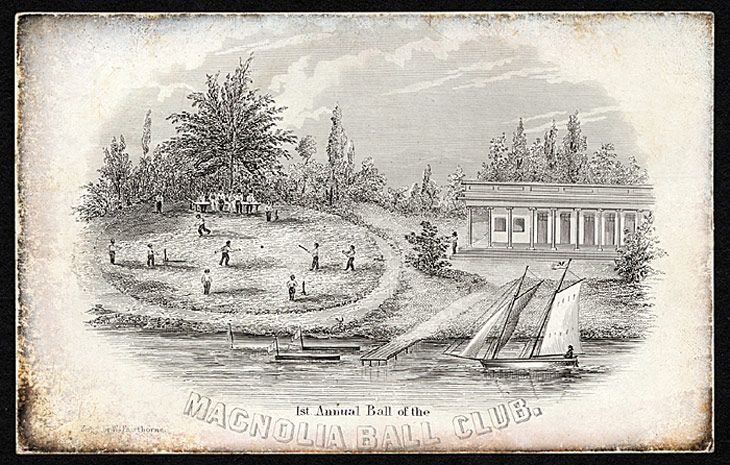 Advertisement for the End-of-Season First Annual Ball for the Magnolia Club (c. 1842) New York -- Among the organized groups that played baseball before the Knickerbockers were the New York, Brooklyn, Olympic, and Magnolia clubs. The last named is the only group still active. However, the Magnolias have never been invited to play other New York or Brooklyn clubs nor were they invited to the NABBP’s organizational meeting in March. Some members of the club claim they are excluded because their ball club is composed not of white-collar sorts and professionals with shorter workdays, but sporting-life characters, from ward heelers to billiard-room operators and bigamists. They venture to guess that the Magnolias are deemed too unseemly a bunch to associate with the clubs that like to present more gentlemanly airs to the public. The Magnolias were founded in the early 1840’s. The president of the group is 29-year-old, Irish-born John McKibbin Jr. He was a U.S. inspector—a patronage position perhaps obtained through the good offices of his father, who in an aldermanic stroke of fortune in 1835 had been named the city’s first Superintendent of Pavements. Seven years after calling the Magnolia Ball Club to muster and chowder, the younger McKibbin found himself a resident of Sing Sing, convicted of bigamy. The vice president and actual leader of the club, Joseph Carlisle, is the 26-year-old proprietor of the Magnolia Lunch and Saloon at 74 Chambers Street, corner of Broadway, offering “the best of Wines, Liquors, Segars, and every other requisite.” Why was this northern eatery named for a flower symbolic of the South? Perhaps to signal to the sporting crowd that this was a “full-service” house of the sort pleasing to Southerners in New York on business, and to the gamblers who left New Orleans after it banned gambling in 1835. The Magnolia Lunch advertised in New Orleans as well as in New York. In the rampant sporting culture of the day, Carlisle was an up-and-comer who went on to run, in addition to the Magnolia Lunch, the Fountain at 167 Walker Street near the Bowery, the Ivy Green in Hoboken, and an unnamed sporting house at 89 Centre Street opposite the Tombs, the city’s Egyptianate prison, where all the while he double-dipped as a jailer. The Magnolia Ball Club secretary, Andrew Lester, is a 27-year-old billiard-room proprietor and Tammany Democrat, linked with Isaiah Rynders’ Empire Club, the pugilistic arm of the party (which gave its name to the Empire Base Ball Club in 1854), enforcing discipline on the rank and file and striking fear into undecided voters. All three Magnolia officers have impeccable working-class, sporting, ruffian, and political associations of the sort that have been associated only with some of the more unruly Brooklyn clubs of the mid-1850s, most notably the Atlantics. Indeed, the Magnolia Ball Club was precisely the sort of poison for which the gentlemanly Knickerbocker Base Ball Club was created as an antidote…two years later. The club was one of the first to play matches at the Elysian Fields, these days a mecca among the New York and Brooklyn ball clubs. The Magnolias lament the fact that exclusion from the rest of the base ball world has taken a severe toll on the club. Membership has dwindled to the point where they can barely gather enough men to play an intra-squad match. Many left for other area base ball clubs. Others have left the game entirely. Those who remain fear the Magnolias soon will go the way of the New York, Brooklyn and Olympic clubs and become an extinct relic of base ball as it was before the Knickerbockers. Philadelphia Cricket Club Downs Delphian Cricketers 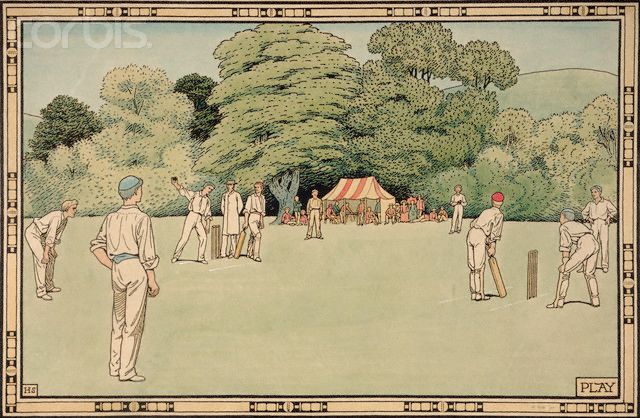 Philadelphia -- The Philadelphia Cricket Club opened match play with a 6 wicket victory over a collection of area cricketers that styled themselves as the 'Delphians.' The match was played on the cricket grounds near Bunker Hill. During the first innings, Delphian received good production from the middle of its order. Vernou and Sheldon led the way, scoring 21 and 31 respectively. Delphian finished the innings with 120 for 10, all out in 47.1 overs. The Philadelphians got off to a slow start. Both William Wister and Thomas Hall were dismissed with no runs in just 12 balls. Walter Newhall was the first to make hay for Philadelphia, scoring 31 in his 96-ball stay. He was dismissed after being caught by Charles Bane. David Jarvis added 22 and Philadelphia finished the first innings with 110 for 10, all out in 57.1 overs. Charles Vernou bowled well for Delphian, yielding 34 runs in 22 overs. He also tallied 13 maidens and took five wickets. At the close of the day, the Delphians led Philadelphia CC by 10 runs. Unfortunately, the Delphian batsmen came out flat on the second day. Only Charles H. T. Collis showed any fight, scoring 30. The Delphian side made 90 for 10 all out. Chasing 100, William Wister and Thomas Hall made up for poor showings in the Philadelphians' first innings by partnering for 76. Hall finished the second innings with a half century (56 runs), not out. Code:
BOXSCORE PHILADELPHIA CC VS. DELPHIAN
PHILADELPHIA CC WINS THE MATCH BY 6 WICKETS
-------------------------------------------
DELPHIAN FIRST INNINGS
C.T. Howe 0 (5) bowled Barclay
Green 9 (17) lbw Johnson
C.H. Banes 10 (17) caught Newhall b Barclay
C.A. Vernou 21 (65) caught Richardson b Barclay
Alsop 0 (12) lbw Wister
C.H.T. Collis 1 (4) caught Sharratt b Barclay
Sheldon 31 (44) lbw Jarvis
Browne 6 (19) lbw Johnson
Owen 0 (8) caught Hall b Wister
R.Kelly 14 (50) caught Hall b Barclay
Hoyt 11 (43) Not Out
EXTRAS
NB: 5
WIDES: 1
LB: 11
BYES: 0
DELPHIAN ALL OUT FOR 120/10 IN 47.1 OVERS
PHILADELPHIA CC BOWLING
O M R W
W.R. Wister 9.0 3 26 2
W.S. Newhall 3.0 2 4 0
J.W. Johnson 12.0 6 26 2
D. Jarvis 11.0 5 25 1
A.C. Barclay 12.1 6 22 5
FALL OF WICKETS
1 - 000 [000.4] (+000) (CT.Howe) with Green
2 - 021 [005.4] (+021) (CH.Banes) with Green
3 - 022 [006.3] (+001) (Green) with CA.Vernou
4 - 024 [010.3] (+002) (Alsop) with CA.Vernou
5 - 025 [011.2] (+001) (CHT.Collis) with CA.Vernou
6 - 077 [024.2] (+052) (Sheldon) with CA.Vernou
7 - 091 [030.1] (+014) (CA.Vernou) with Browne
8 - 091 [031.0] (+000) (Browne) with Owen
9 - 094 [033.1] (+003) (Owen) with R.Kelly
10 - 120 [047.0] (+026) (R.Kelly) with Hoyt
OUTSTANDING PERFORMANCES IN THE INNINGS
BATTING
031 (044) Sheldon
021 (065) C.A. Vernou
014 (050) R. Kelly
011 (043) Hoyt
BOWLING
05/022 (012.1) A.C. Barclay
02/026 (012.0) J.W. Johnson
02/026 (009.0) W.R. Wister
01/025 (011.0) D. Jarvis
--------------------------------------------
PHILADELPHIA CC FIRST INNINGS
W.R. Wister 0 (3) caught Green b Vernou
T.M. Hall 0 (9) caught Hoyt b Collis
W.S. Newhall 31 (96) caught Barnes b Collis
J.B. England 14 (50) caught Sheldon b Vernou
C. Sharratt 0 (6) caught Hoyt b Vernou
J.W. Johnson 14 (41) caught Kelly b Collis
D. Jarvis 22 (71) Not Out
A.C. Barclay 0 (1) lbw Collis
T. Facon 0 (6) caught Green b Vernou
Hawthorne 0 (1) caught Banes b Vernou
Richardson 19 (62) bowled Sheldon
EXTRAS
NB: 3
WIDES: 3
LB: 4
BYES: 0
PHILADELPHIA CC ALL OUT FOR 110/10 IN 57.1 OVERS
DELPHIAN BOWLING
O M R W
C.A.Vernou 22.0 13 34 5
C.H.T. Collis 20.0 9 39 4
Sheldon 0.1 0 0 1
Owen 15.0 9 27 0
FALL OF WICKETS
1 - 000 [000.2] (+000) (W.R. Wister) with T.M.Hall
2 - 000 [003.2] (+000) (T.M. Hall) with W.S. Newhall
3 - 030 [019.5] (+030) (J.B. England) with W.S. Newhall
4 - 033 [022.2] (+003) (C.Sharratt) with WS.Newhall
5 - 051 [031.4] (+018) (W.S. Newhall) with JW.Johnson
6 - 066 [036.1] (+015) (J.W. Johnson) with D.Jarvis
7 - 066 [036.2] (+000) (A.C. Barclay) with D.Jarvis
8 - 067 [037.3] (+001) (T. Facon) with D.Jarvis
9 - 067 [037.4] (+000) (Hawthorne) with D.Jarvis
10 - 110 [057.0] (+043) (Richardson) with D.Jarvis
OUTSTANDING PERFORMANCES IN THE INNINGS
BATTING
031 (096) W.S. Newhall
022 (071) D.Jarvis
019 (062) Richardson
014 (041) JW.Johnson
BOWLING
05/034 (022.0) C.A. Vernou
04/039 (020.0) C.H.T. Collis
01/000 (000.1) Sheldon
00/027 (015.0) Owen
-------------------------------------------
DELPHIAN SECOND INNINGS
C.T. Howe 0 (3) lbw Barclay
Green 9 (18) caught & b Johnson
C.H. Banes 1 (6) bowled Johnson
C.A. Vernou 2 (6) caught Facon b Wister
Alsop 3 (11) lbw Johnson
C.H.T. Collis 30 (147) caught Richardson b JW.Johnson
Sheldon 8 (55) bowled Barclay
Browne 1 (7) lbw Wister
Owen 1 (14) caught & b Barclay
R.Kelly 6 (27) lbw Barclay
Hoyt 6 (38) Not Out
EXTRAS
NB: 7
WIDES: 3
LB: 13
BYES: 0
DELPHIAN ALL OUT FOR 90/10 IN 54.5 OVERS
PHILADELPHIA CC BOWLING
O M R W
W.R. Wister 10.0 7 7 2
W.S. Newhall 3.0 1 2 0
J.W. Johnson 12.5 7 14 4
D. Jarvis 13.0 6 25 0
A.C. Barclay 16.0 7 19 4
FALL OF WICKETS
1 - 001 [000.2] (+001) (C.T. Howe) with Green
2 - 006 [001.4] (+005) (C.H. Barnes) with Green
3 - 012 [003.4] (+006) (C.A. Vernou) with Green
4 - 017 [005.5] (+005) (Alsop) with Green
5 - 020 [008.1] (+003) (Green) with CHT.Collis
6 - 041 [025.4] (+021) (Sheldon) with CHT.Collis
7 - 047 [028.4] (+006) (Browne) with CHT.Collis
8 - 068 [033.3] (+021) (Owen) with CHT.Collis
9 - 080 [042.3] (+012) (R. Kelly) with CHT.Collis
10 - 090 [054.4] (+010) (C.H.T. Collis) with Hoyt
OUTSTANDING PERFORMANCES IN THE INNINGS
BATTING
030 (147) C.H.T. Collis
009 (018) Green
008 (055) Sheldon
006 (027) R. Kelly
BOWLING
04/014 (012.5) J.W. Johnson
04/019 (016.0) A.C. Barclay
02/007 (010.0) W.R. Wister
00/002 (003.0) W.S. Newhall
-------------------------------------------
PHILADELPHIA CC SECOND INNINGS
W.R. Wister 27 (72) caught Vernou b Owen
T.M. Hall 56 (127) Not Out
W.S. Newhall 1 (14) bowled Collis
J.B. England 7 (20) caught & b Collis
C. Sharratt 0 (5) caught & b Collis
J.W. Johnson 4 (11) Not Out
D. Jarvis Did Not Bat
A.C. Barclay Did Not Bat
T. Facon Did Not Bat
Hawthorne Did Not Bat
Richardson Did Not Bat
EXTRAS
NB: 3
WIDES: 1
LB: 5
BYES: 0
PHILADELPHIA CC 104/4 IN 41.2 OVERS
DELPHIAN BOWLING
O M R W
C.A. Vernou 15.0 5 33 0
C.H.T. Collis 14.2 8 27 3
Sheldon 2.0 0 9 0
Browne 1.0 0 4 0
Owen 9.0 3 22 1
FALL OF WICKETS
1 - 074 [024.0] (+074) (W.R. Wister) with T.M. Hall
2 - 075 [029.1] (+001) (W.S. Newhall) with T.M. Hall
3 - 088 [036.1] (+013) (J.B. England) with T.M. Hall
4 - 092 [038.0] (+004) (C. Sharratt) with T.M. Hall
OUTSTANDING PERFORMANCES IN THE INNINGS
BATTING
056 (127) T.M. Hall
027 (072) W.R. Wister
007 (020) J.B. England
004 (011) J.W. Johnson
BOWLING
03/027 (014.2) C.H.T. Collis
01/022 (009.0) Owen
00/033 (015.0) C.A. Vernou
00/004 (001.0) Browne
British Cricket News Cambridge, UK, 23 April -- In a trial match of cricket at FP Fenner's Ground at Cambridge, the Cambridge University first squad lost to its second team (Cambridge University Next XXII) by an innings and 78 runs. Charles Cook led off the innings for Cambridge with a very respectable 83 before being holed out by Hornby. The partnership between Cook and Edward Horne was productive, generating 101 runs. After Horne was bowled by Charles Brereton, the other Cambridge batsmen only were able to add 48 before the end of the innings with a total of 149 all out. Brereton was in good form for the second squad and served up ducks to GS Gruggen and Henry Arkwright in consecutive deliveries. Charles Royds and Dillingham Seppings partnered for 63 and the Next XXII tallied 290 all out in their side of the innings. Brereton continued his dominant bowling the next day in Cambridge's side of the second innings. He took seven wickets in 25 overs and Cambridge was held to 63 runs all out. Horse Racing Results 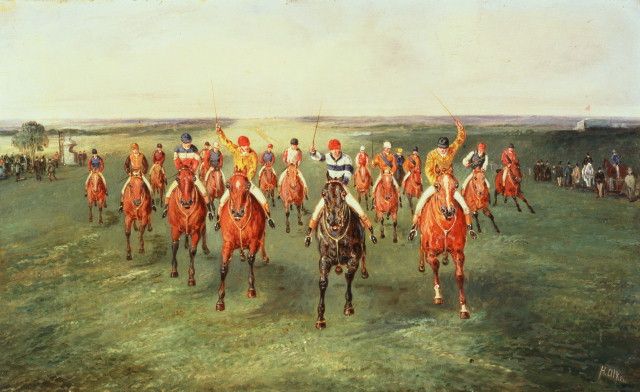 The finish of the Two Thousand Guineas at Newmarket Grand National (at Aintree Racecourse in Liverpool) Handicap steeplechase. Surface: Turf. Distance over 4 miles (3-1/2 furlongs) 1858 Winner -- Little Charley ridden by William Archer; owned by Christopher Capel 2,000 Guneas Stakes (at the Rowley Mile at Newmarket) Open to three-year-old thoroughbred colts and fillies. Surface: Turf. Distance: 1 mile 1858 Winner -- Fitz-Roland ridden by John Wells; owned by Sir Joseph Hawley 1,000 Guineas Stakes (at the Rowley Mile at Newmarket) Open to three-year-old thoroughbred colts and fillies. Surface: Turf. Distance: 1 mile 1858 Winner -- Governess ridden by Tom Ashmall; owned by William Gratwicke Upcoming Races: June: The Derby at Epsom Downs in Surrey. Open to three-year-old thoroughbred colts and fillies. Surface: Turf. Distance: one mile, four furlongs and ten yards. The Oaks Stakes at Epsom Downs in Surrey. Open to three-year-old thoroughbred colts and fillies. Surface: Turf. Distance: one mile, four furlongs and ten yards. September: The St. Leger Stakes at Doncaster. Open to three-year-old thoroughbred colts and fillies. Surface: Turf. Distance: one mile, six furlongs and 132 yards. Last edited by sflcat61; 08-30-2016 at 11:55 AM. |
|
|

|
|
|
#62 |
|
All Star Reserve
Join Date: Jul 2002
Location: Kentucky
Posts: 929
|
Let those ruffian Magnolias reap what they sowed, I say!
|
|
|

|
|
|
#63 |
|
Minors (Double A)
Join Date: May 2008
Location: South Florida
Posts: 117
|
The Scalawags!!!
|
|
|

|
|
|
#64 |
|
Minors (Double A)
Join Date: May 2008
Location: South Florida
Posts: 117
|
The Republic
June 1858 National News More Violence in 'Bleeding' Kansas 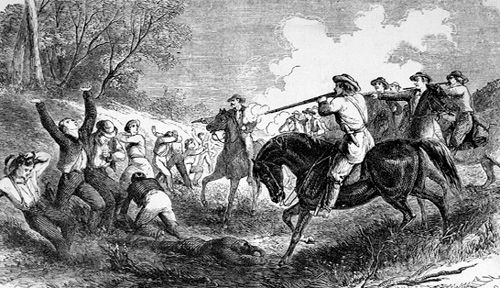 Pro-Slavery Ruffians Murder Free-Staters in Latest Bleeding Kansas Violence After months of relative calm in Kansas territory, some of the worst violence to date erupted between pro- and anti-slavery factions, leaving five dead, and five seriously wounded. On 19 May, a small band of about 30 pro-slavers stopped at the village of Trading Post, in Linn County. Eleven abolitionists and free-staters were captured in their fields or taken from their homes and marched into a ravine approximately 4 miles northeast of Trading Post and shot. Five of the prisoners were killed, five were seriously wounded and one was unharmed. None of the men captured were armed or, it is said, had participated in the ongoing violence. The names of the killed were: William Stilwell of Sugar Mound, recently from the state of Indiana. He was a young man, not over 28 and had a young wife and 2 small children. When he left home the morning of the massacre, his wife, with a presentiment of evil on her mind, urged him to take the Territorial road to Kansas City via of Osawattomie (sic). He assured her that there was no danger in taking the most direct road -- that he was known as (a) peace(ful) man and would not be molested. He was killed with a double-barreled shot-gun, loaded with pistol balls, the charge entering his left breast. Patrick Ross was an Irishman, who had been driven from his claim on the Little Osage, by a band of border ruffians. Mr. Colpetzer, a farmer from Pennsylvania. He was a quiet, peaceable man -- a fair type of that class of sturdy settlers who, snugly nestled among the green hills and valleys of the land of Penn, have by generations of thrift and industry, made her character for sobriety and good will proverbial to the world. He left a wife and family. Michael Robinson was a farmer from Iowa. He was a good citizen and universally respected. John F. Campbell, the storekeeper, was from Pennsylvania. He was of a remarkably social disposition and had endeared himself to all who knew him. He was quite young and had never been married. The wounded were Wm. Hairgorve, Asa Hairgrove, Charles Reed, Amos Hall and Charles Snyder. Wm. Hairgrove and Asa Hairgrove are brothers, originally from Georgia, who came to Kansas to live in a Free State. The Rev. Charles Reed is a Baptist clergyman from Wisconsin, who moved into the neighborhood of the Post the week previous to the tragedy. He denounced the course of the border-ruffians in public which had earned their hatred. Amos Hall was a settler and Charles Snyder, the blacksmith, was shot in the leg and back. The dead were brought to the village (of Trading Post) and placed in one of the houses. Some of the seriously wounded were there also; among them "Preacher Reed", as he was familiarly termed, who had crawled off into the woods after he was shot and was not found until the morning following, when he was discovered by his wife, who had searched for him all night and who had him conveyed to the town, where his wounds, which were dangerous, could be tended to and dressed. The survivors identified the leader of the raiding band as Charles Hamilton, who was known to them because he had been a resident of Linn County. Hamilton was originally from Georgia, owned slaves and had been forced off his land in Linn County and driven to Missouri by abolitionists. After the massacre, it is believed that Hamilton and his men returned to Missouri. The outbreak of new violence was a blow to efforts by federal troops at Fort Scott under command of Captain Nathaniel Lyon to restore law and order to the territory. Since 1855, there have been 59 deaths attributed to violence between pro-slavers and abolitionists. Minnesota Celebrates Statehood 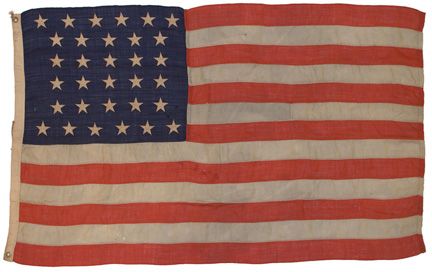 Minnesota entered the Union as the 32nd state on 11 May . Known as the "Land of 10,000 Lakes," Minnesota is the northern terminus of the Mississippi River's traffic and the westernmost point of the inland waterway that extends through the Great Lakes and the St. Lawrence Seaway to the Atlantic Ocean. White settlement of the area began in 1820 with the establishment of Fort Snelling. In 1849, Minnesota became a U.S. territory. The building of railroads and canals brought a land boom during the 1850s, and Minnesota's population swelled from only 6,000 in 1850 to more than 150,000 by 1857. Former Missouri Senator Dies 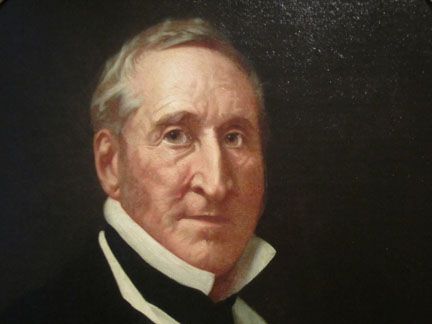 Washington DC – Former Missouri Senator Thomas Hart Benton, nicknamed Old Bullion died in April. Thomas Hart Benton was originally from North Carolina, but became a Senator in Missouri after being kicked out of the University of North Carolina and after serving in the Tennessee state militia under Andrew Jackson. Benton earned the name Old Bullion for his hard money views and ferociousness in debate. Benton was an unflagging advocate for gold coin (specie) or bullion as money—as opposed to paper money backed by gold. "Soft" currency, in his opinion, favored rich urban Easterners at the expense of the small farmers and tradespeople of the West. Benton was a legendary duelist and he was involved in many duels, including a pair involving attorney and Missouri legislator Charles Lucas. In 1817, the two had accused each other of lying when on opposite sides of a court case and later in the year, they had a dispute during an election about Benton’s eligibility to vote. Benton called Lucas an “insolent puppy” and Lucas demanded satisfaction. During the first duel at 30 paces, Lucas was shot through the throat, but survived. Benton was shot just below the knee. During the second duel, at nine paces, Lucas died less than an hour after being shot close to the heart. Benton was uninjured. Benton also was involved in a legendary brawl with Andrew Jackson. The fight between Jackson and Benton started while Jackson was general of the Tennessee militia and Benton was his aide-de-camp. There was a quarrel between Jackson’s friend and Benton’s brother, which resulted in a duel in which both men took bullets but survived. Jackson was present at the duel and a mediator. Benton accused Jackson of conducting the affair of honor unfairly and Jackson decided that Benton and his brother, “both deserved a thrashing.” Jackson ran into Benton and his brother outside a hotel and a brawl ensued. Jackson was hit by two bullets, one in the left arm and one in the left shoulder, which ruptured an artery. Several Jackson friends and relatives entered the brouhaha and pulled Jackson out of a pool of blood. Benton received several knife wounds, but escaped significant injury because he fell down a flight of stairs early in the fight. The fight was a political embarrassment for Jackson, who was a much older man than Benton, after he nearly died from his wounds. However, despite the deadly struggle between them and the bad feelings, Jackson and Benton would reconcile and become strong allies when Jackson became president of the United States. Benton was “Jackson’s voice” in the Senate and was critical to Jackson’s victory in his war against the Second Bank of the United States. Years after the fight Benton was asked if he knew Andrew Jackson and he replied, “Yes, sir, I knew him, sir; General Jackson was a very great man, sir. I shot him, sir. Afterward he was of great use to me, sir, in my battle with the United States Bank.” International News Rose Makes Gains For British In Central India Campaign 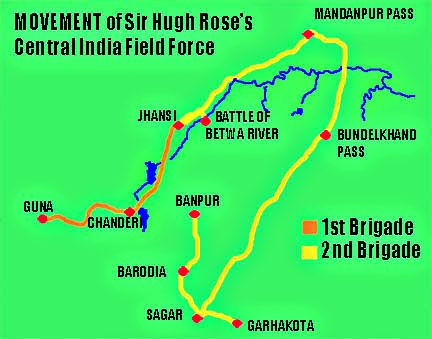 Sir Hugh Rose, who assumed the command of the Central India Field Force on 17 December 1857, has made impressive British gains in Cenral India. In January, the Raja of Banpur was defeated by Rose’s 2nd Brigade in a Skirmish type battle. At Barodia the Raja of Banpur again and Anant Singh were defeated in a battle whose intensity and magnitude may be gauged from the fact that the 2nd Brigade only suffered casualties of 2 men killed and 21 wounded. Sagar was relieved by the 2nd Brigade with whom Rose was marching on 3rd February. The relief of Sagar made communication and cooperation with the 1st Brigade possible because of the direct road link between Sagar and Guna, where the advance guard of the 1st Brigade was located. From Sagar, Hugh Rose and his 2nd Brigade advanced to Garhakota which was captured after a brief siege on 12 February. Again British casualties were light with none killed and four wounded. After Garhakota, Rose went back to Sagar for rest and resupply. Rose resumed his advance on 27 February and took the passes leading into Bundelkhand by resorting to feint attacks that misled the various local rulers about his direction of attack. Again these were insignificant operations since the fighting was nominal. At the battle of Madanpur Pass fought on 3 March, Rose suffered casualties of none killed and 12 wounded. Chanderi was besieged and captured by the 1st Brigade on 17 March with a loss of just 3 killed and 23 wounded. Meanwhile Rose ordered the 1st Brigade to join him for the siege of Jhansi. The 1st Brigade marched from Chanderi towards Jhansi and joined the 2nd Brigade on 25th March at Jhansi. British forces found Jahnsi well-defended and the fort had heavy guns which could fire over the town and nearby countryside. Rose demanded the surrender of the city; if this was refused it would be destroyed. After due deliberation the Rani Lakshmibai of Jhansi issued a proclamation: "We fight for independence. In the words of Lord Krishna, we will if we are victorious, enjoy the fruits of victory, if defeated and killed on the field of battle, we shall surely earn eternal glory and salvation." She defended Jhansi against British troops when the siege began on 23 March 1858. The British bombardment was met by heavy return fire. 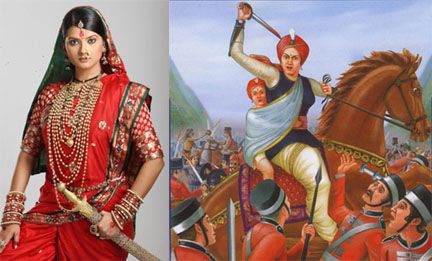 The Rani Lakshmibai The defenders sent appeals for help to rebel leader Tatya Tope. His army of more than 20,000 tried to relieve Jhansi but was defeated by Rose on 31 March near the Betwa River. During the battle with Tatya Tope's forces, part of the British forces continued the siege and by 2 April it was decided to launch an assault by a breach in the walls. Four columns assaulted the defenses at different points and those attempting to scale the walls came under heavy fire. Two other columns had already entered the city and were approaching the palace together. Determined resistance was encountered in every street and in every room of the palace. Street fighting continued into the following day. The Rani withdrew from the palace to the fort and after taking counsel decided that since resistance in the city was useless she must leave. With her son Damodar Rao on her back she jumped on her horse Badal from the fort and escaped. It is believed that the Rani Lakshmibai has joined Tatya Tope in Kalpi. Last edited by sflcat61; 05-05-2016 at 11:41 AM. |
|
|

|
|
|
#65 |
|
Minors (Double A)
Join Date: May 2008
Location: South Florida
Posts: 117
|
The Sport
June 1858 'Old Smoke’ Morrissey to Meet John Heenan in Fall Bout 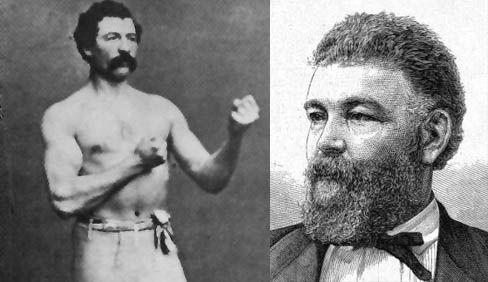 John C. Heenan (l) and John ‘Old Smoke’ Morrissey (r) New York -- John ‘Old Smoke’ Morrissey has agreed to fight John Heenan this fall for the championship of America. Morrissey is the reigning champion of America. He won his title in controversial fashion from “Yankee” Sullivan in 1853. Sullivan knocked out Morrissey and left the ring, thinking he’d won. However, Morrissey’s firsts were able to rouse him and get him back to scratch. With Sullivan gone, Morrissey was declared the winner. Morrissey’s last fight was in 1854 against William “Bill the Butcher” Poole. There was a history of bad blood between Morrissey, an Irishman and Tammany Hall Democrat, and Poole, an enforcer for the Know-Nothing Party and a leader of the Bowery Boys. It began after the Sullivan fight when Poole, who had heavily wagered on Sullivan, disputed the result of the bout and insisted wagers shouldn’t be honored. Poole beat Morrissey badly. According to the New York Daily Times, Morrissey “presented a shocking spectacle, and scarcely could any of his friends recognize him. His eyes were closed and one of them was found to be gouged from one end of the socket, which injury will probably impair his sight for life. There were large bunches on all parts of his head. His face above and below the eyes is blackened by violent blows given on the bridge of his nose. There is a hole in his cheek, and his lips are chewed up in a frightful manner. He also sustained fearful injuries about his breast, arms, and back, where Poole kicked him with heavy cowhide boots after he helloed enough. So severe are Morrissey's injuries, that it is very doubtful whether he walks in the street for the next six months.” Several months later, Lew Baker, a former NYPD officer and close friend of Morrissey, sought vengeance. He and two companions entered Stanwix Hall, a bar on Broadway that is a center of the city’s night life, where he confronted and shot Poole. Poole died two weeks later. Morrissey and Baker were indicted for murder, but the charges were dropped after three trials resulted in hung juries. New York-born Heenan, known as ‘the Benicia Boy’, made a name for himself as a brawler in the California gold fields. Heenan’s manager and trainer, Englishman Jim Cusick, has been actively pursuing a title fight with Morrissey.  Sayers to Meet Paddock in June Bout The long anticipated bout between Tom Sayers and Tom Paddock for the championship of England will take place at some point in June. The location of the fight is being kept close to the vest by organizers to prevent the police from disrupting the event. Although prizefighting in England is supported by members of the establishment from royal princes downwards, it is considered illegal under the terms of the Riot Act of 1715. Fights are typically held in warehouses, courtyards of inns, or in open fields away from the eyes of local authorities. Philadelphia Defeats Young America 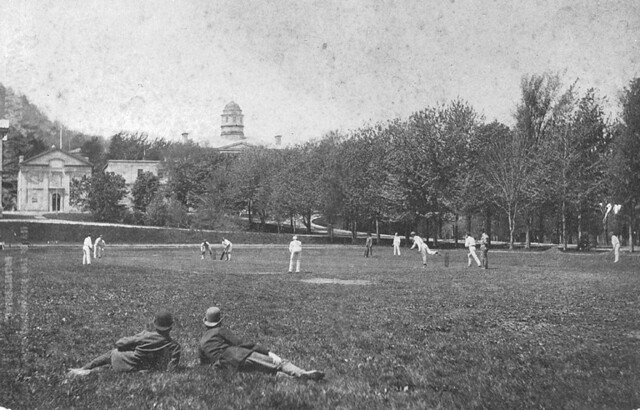 Camden, NJ – At the Cricket Grounds in Camden, the Philadelphia Cricket Club (106 and 104) downed Young America (59 and 67) by 84 runs. On the first day, Widdis and Newhall bowled masterfully for the Young Americans in the early going, retiring Howe, Wister and Johnson. Tom Facon finally showed some punch for the Philadelphians, collecting 16 runs. Later in the innings Barclay added 22 before being run out. Only Newhall showed any game at bat for the Young Americans, scoring 14 runs. On the second day it was J.B. England who led the way for the Philadelphia batsmen with 23 runs. For Young America, Fisher produced a plucky 12 and was not out, but his mates showed little fight. W.S. Newhall was the only other Young American to score double digit runs, with 10. Code:
BOXSCORE PHILADELPHIA CC VS. YOUNG AMERICA
PHILADELPHIA CC WINS THE MATCH BY 84 RUNS
-------------------------------------------
PHILADELPHIA CC FIRST INNINGS
T.M. Hall 0 caught Knox b Widdis
C.T. Howe 0 bowled G.M. Newhall
W.R. Wister 3 bowled G.M. Newhall
J.W. Johnson 10 bowled G.M. Newhall
T. Facon 16 caught Carpenter b Newhall
C.B. Sharratt 12 run out
J.H. Kuhn 5 bowled Widdis
A.C. Barclay 22 run out
Richardson 4 bowled G.M. Newhall
J.B. England 6 bowled Widdis
B.M. Dusenberry 6 not out
EXTRAS
NB: 1
WIDES: 12
LB: 2
BYES: 8
PHILADELPHIA CC ALL OUT FOR 106/10 IN 41 OVERS
YOUNG AMERICA BOWLING
O M R W
Widdis 20.0 5 43 3
W.S. Newhall 4.0 0 14 1
G.M. Newhall 17.0 4 28 4
--------------------------------------------
YOUNG AMERICA FIRST INNINGS
E. Fisher 0 bowled Barclay
G.M. Newhall 3 caught Hall b Johnson
Fryer 0 bowled Barclay
H.L. Newhall 7 bowled Johnson
W.S. Newhall 14 caught and b Barclay
F. Wister 5 lbw Johnson
Carpenter 6 caught Kuhn b Johnson
McIntyre 3 not out
Knox 1 run out
J.D. Rodney 2 bowled Barclay
Widdis 3 caught and b Johnson
EXTRAS
NB: 1
WIDES: 12
LB: 1
BYES: 2
YOUNG AMERICA ALL OUT FOR 59/10 IN 26.3 OVERS
PHILADELPHIA CC BOWLING
O M R W
Barclay 13.0 4 24 4
J.W. Johnson 13.3 2 19 5
-------------------------------------------
PHILADELPHIA CC SECOND INNINGS
T.M. Hall 5 bowled G.M. Newhall
C.T. Howe 7 caught Wister b G.M. Newhall
W.R. Wister 2 run out
J.W. Johnson 2 bowled Fisher
T. Facon 10 caught W.S. Newhall b Fisher
C.B. Sharratt 12 caught Rodney b Fisher
J.H. Kuhn 11 bowled Wister
A.C. Barclay 4 retired hurt
Richardson 5 bowled G.M. Newhall
J.B. England 23 not out
B.M. Dusenberry 0 caught W.S. Newhall b G.M. Newhall
EXTRAS
NB: 9
WIDES: 15
LB: 2
BYES: 6
PHILADELPHIA CC ALL OUT FOR 104/10 IN 46.4 OVERS
YOUNG AMERICA BOWLING
O M R W
G.M. Newhall 14.0 2 34 4
Widdis 6.0 3 11 0
Fisher 18.4 10 18 3
Wister 7.0 1 9 1
--------------------------------------------
YOUNG AMERICA CC SECOND INNINGS
E. Fisher 12 not out
G.M. Newhall 3 run out
Fryer 7 run out
H.L. Newhall 3 bowled Johnson
W.S. Newhall 10 bowled Howe
F. Wister 3 run out
Carpenter 4 caught Howe b Johnson
McIntyre 0 bowled Howe
Knox 5 caught Facon b Howe
J.D. Rodney 0 lbw Dusenberry
Widdis 3 bowled Dusenberry
EXTRAS
NB: 16
WIDES: 15
LB: 2
BYES: 0
YOUNG AMERICA ALL OUT FOR 67/10 IN 25 OVERS
PHILADELPHIA CC BOWLING
O M R W
Howe 12.0 2 19 3
Dusenberry 6.0 2 10 2
J.W. Johnson 6.0 1 18 2
Wister 1.0 0 4 0
May Cricket Match Results in England Cambridge University Defeats Gentlemen of Cambridgeshire by 6 Wickets 06 May, FP Fenner's Ground, Cambridge -- The Cambridge University men (149 and 89/4) defeated the Gentlemen of Cambridgeshire (117 and 113) by 6 wickets. Only the Gentlemen's Frederick Bell showed any pluck with the bat during the first innings, producing 69 runs of Cambridgeshire's 117 and was not out. G.E. Cotterill and F.H. Norman were the top batsmen for Cambridge, scoring 38 and 29 for Cambridge. The University men tallied 149 in their first innings. Bell led the way again in Cambridgeshire's second innings, scoring 57, not out, and the Gentleman finished the second innings with 113. Chasing 88, the University men saw good production from Bayford (20), Royds (22) and Cotterill (19), winning the match midway through the order. Cambridge University routs Cambridge Town Club 13, 14 May, FP Fenner's Ground, Cambridge -- F.H. Norman and W.H. Benthall both had centuries as the University men tallied 312, all out, in their first innings. Cambridge Town Club batted first and scored 151, all out, in their side of the innings, which was less than half of the University men's total. The Cambridge Town Club conceded the match following the University men's first innings. All England Eleven Defeats Oxford University 17, 18, 19, 20 May, Magdalen Ground, Oxford -- In a four day affair, the All England Eleven (82 and 121) cricketers defeated Oxford University (77 and 103) by 23 runs. Other Match Results 01 May -- Peripatetics defeated Westminster by 103 runs at Vincent Square, Westminster (1-day match) 06 May -- Match drawn between Windsor Garrison and I Zingari at Windsor Calvary Barracks, Windsor (1-day match) 10 May -- Match drawn between Earl of Winterton's XI and FTA Hervey-Bathurst's XI at Lord's Cricket Ground, St. John's Wood (1-day match) 13 May -- Match drawn between Oxford and Oxfordshire at Magdalen Ground, Oxford (1-day match) 14 May -- Cheltenham College defeated Marlborough College by 6 wickets at College Ground, Cheltenham (2-day match) 15 May -- Match drawn between Maidenhead and Peripatetics at Maidenhead (1-day match) 17 May -- Ireland defeated Marylebone Cricket Club by an innings and 10 runs at Lord's Cricket Ground, St. John's Wood (2-day match) 22 May -- Match drawn between Eton College and I Zingari at Agar's Plough, Eton College (1 day match) 25 May -- Match drawn between Eton College and Windsor Garrison at Agar's Plough, Eton College (1 day match) 27 May -- Harrow School defeated Household Brigade by an innings and 46 runs at Harrow School Cricket Ground, Harrow-on-the-Hill (1-day match) 28 May -- Bradford defeated Broughton by an innings and 14 runs at Broughton Cricket Club Ground, Salford (2-day match) 29 May -- Match drawn between Bullingdon and I Zingari at Bullingdon Green, Oxford (1-day match) 31 May -- Match drawn between Earl of Winterton's XI and JG Boothby's XI at Lord's Cricket Ground, St. John's Wood (1-day match) Last edited by sflcat61; 06-10-2016 at 10:18 AM. |
|
|

|
|
|
#66 | |
|
Minors (Double A)
Join Date: May 2008
Location: South Florida
Posts: 117
|
The Republic
July 1858 National News Illinois Republican Senate Hopeful Delivers Speech on Threat of Divided Nation 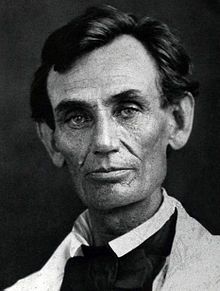 Illinois Republican candidate for U.S. Senate, Abraham Lincoln Springfield, IL -- At the Illinois state capitol, Abraham Lincoln, 49, accepted the nomination of the fledgling Republican party to run for the U.S. Senate against the Democrat incumbent, Stephen A. Douglas. Upon accepting the nomination, Lincoln delivered a speech about how the United States has become like a "House Divided," drawing on the biblical verse found in Mark 3:25. Quote:
Lincoln was born in Hardin County, Kentucky. His family moved first to Indiana, and later to Illinois. As an adult, Lincoln settled in New Salem, Illinois in Sangamon County. Lincoln served as a captain in the Illinois Militia during the Black Hawk War. After the war, Lincoln ran for the Illinois General Assembly and finished eighth out of 13 candidates. Lincoln served as New Salem's postmaster and later as county surveyor. He then decided to become a lawyer and began teaching himself law by reading Blackstone's Commentaries on the Laws of England and other law books. In 1834, Lincoln ran a second campaign for the state legislature and won. Though he ran as a Whig, many Democrats favored him. He served four successive terms in the Illinois House of Representatives as a Whig representative from Sangamon County. In 1836, Lincoln was admitted to the bar. He moved to Springfield, Illinois and began to practice law under John T. Stuart. Lincoln became a successful lawyer with a reputation as a formidable adversary during cross-examination. In 1840, Lincoln was married to Stuart's cousin, Marry Todd. In 1844 he began his own law practice. In 1846, Lincoln was elected to the U.S. House of representatives, where he served one two-year term. He was the only Whig in the Illinois delegation, but he showed party loyalty by participating in almost all the votes and making speeches that echoed the party line. He partnered with abolitionist Congressman Joshua R. Giddings in writing a bill that abolished slavery in the District of Columbia. The bill compensated former owners, enforced fugitive slave laws and proposed a popular vote on the matter. Lincoln abandoned the bill when it failed to garner sufficient Whig support. Lincoln spoke out against the Mexican-American War, which he attributed to President Polk's desire for "military glory." He also supported the Wilmot Proviso, which, if adopted, would have banned slavery in U.S. territory won from Mexico. Following the split in the Whig party caused by the Kansas Act, Lincoln was instrumental in forging the shape of the new Republican Party, drawing on Whigs, disenchanted Free Soil, Liberty and Democrat party members. At the 1856 Republican National Convention, Lincoln placed second in the contest to become the party's candidate for vice president. Douglas remains popular. During his career, he has tried to steer a middle course on the slavery issue. His popular sovereignty doctrine has been satisfactory to Southerners who don't want outside interference with slavery and Northerners who don't want to take sides over it. It has been famously said of him that he doesn't care whether slavery is voted up or down, as long as it is voted on by the people. Despite this, Douglas has taken the side against President James Buchanan and his Southern allies to admit Kansas Territory as a slave state. It is said the two have become bitter enemies. Slavery has been a divisive issue between Northern and Southern Democrats and could eventually splinter the party. International News War in Mexico: Liberals Establish New Capital in Veracruz Ousted President Benito Juárez and his Liberal supporters have set up a new capital in Veracruz after being forced to flee from Mexico City during a coup led by army general Félix Zuloaga. Juárez and other liberals gained political control in Mexico following the loss of about half of Mexico's colonial territory to the United States in the Mexican-American War. Believing the Church and military were the source of most of Mexico's problems, the Liberals passed a series of Reform Laws that allowed the government to confiscate Church land and convert it to private property. The laws also prohibited corporate bodies from owning lands, which included communal land owned by Indian villages. Also, religious celebrations outside churches was forbidden as was the use of church bells and clerical dress in public. These laws met strong resistance from Conservatives, the Church and the military. General Tomás Mejía rebelled against the Liberal government in the defense of the Catholic identity of Mexico in the Sierra Gorda region of Querétaro. Opposition to the these laws culminated in a take over of Mexico City by Conservative forces. This operation was called the Plan of Tacubaya and was led by Zuloaga. The Plan of Tacubaya deeply divided the country, with each state deciding whether to support the Liberals' Reform Constitution or the Conservatives' takeover of Mexico City. Juárez who was imprisoned, escaped and fled to the city of Querétaro. Júarez was recognized as the Liberals' interim president. As Zuloaga and the army have taken more of the central part of Mexico, Juárez and his government was forced to retreat to the city of Veracruz. From there, the Liberal government has control over the state of Veracruz and a number of allied states in the north and central-west. Last edited by sflcat61; 10-20-2014 at 07:56 PM. |
|
|
|

|
|
|
#67 |
|
Minors (Double A)
Join Date: May 2008
Location: South Florida
Posts: 117
|
The Sport
July 1858 Sayers Crushes Paddock to Claim British Championship 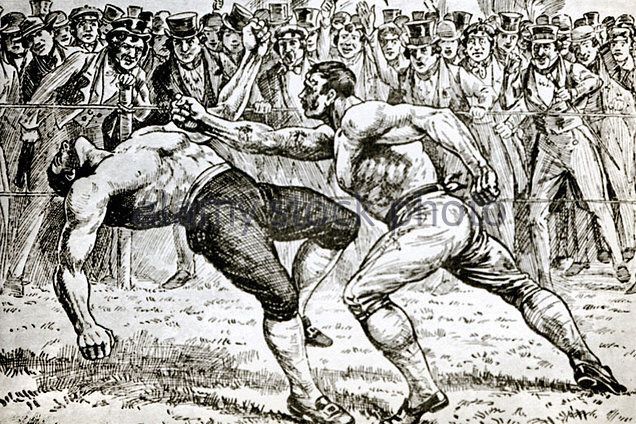 Tom Sayers knocks out Tom Paddock in Round 3 Canvey Island, Essex – It only took three rounds for “Brighton Boy” Tom Sayers to dispatch Tom Paddock and claim the “Fighting Championship of England.” In the first round, Sayers came out light and nimble on his toes. Paddock tried to close and use his size advantage, but Sayers stayed out of range. The two spent time feinting and trading jabs, but neither was able to land a major blow. Paddock once again closed and tried to grab Sayers’ neck and throw him. Sayers countered with several punches that clearly stunned Paddock causing him to stumble and fall. In the second round, Paddock was sluggish and fought defensively. Sayers pressed his advantage. He landed several hard blows, including one that drew a jet of blood from Paddock’s nose. Worse for wear, Paddock once more tried to press his size advantage and lunged in, and again Sayers was ready and counter punched. Paddock was staggered once more, his knees almost buckling, and Sayers closed and delivered several hard blows to the head and face that sent Paddock to the ground. Paddock was barely able to make scratch for the third round, a steady stream of blood flowed from his nose and a large knot appeared above his right eye. Sayers still looked fresh, with only a bruise marring his right cheek. Sayers began the round with a furious volley of blows and caught Paddock in the forehead with one. Paddock went down. His seconds were unable to revive him in time to make scratch for a fourth round and the judge awarded the fight to Sayers. As Paddock was helped from the site, he was roundly jeered for his poor showing by many of the spectators that had wagered on him. In contrast, Sayers, with his arms lifted in triumph, left to cheers and hearty backslaps. (Actual Fight: Sayers defeats Paddock in 21 rounds) New York Game: Excelsior Routs Eagle Hoboken -- The Excelsiors of Brooklyn and Eagles of New York met on June 24th. The Brooklynites scored many runs in the early innings to coast to a 35-8 victory. Each squad was short two or three of their regulars. Despite this, the play on both sides was animated throughout. However, by the conclusion of the 4th inning, it became clear that the Excelsiors (leading 30-5) were bound for victory. First baseman Markham led Brooklyn with six runs scored. Veteran catcher Gelston was game for the Eagles, scoring half of their 8 runs. Code:
R H E
Excelsior – 7 6 8 9 0 1 0 1 3 – 35 45 8
Eagle – 1 1 1 2 0 0 1 1 1 – 8 21 13
Hoboken – On June 30th, Excelsior and Knickerbocker played what is believed to be the first game using the ‘fly ball’ rule in association with the Knickerbocker rules of baseball on the Elysian grounds. In Association ball, an out is recorded if a ball hit into the air is either caught or fielded on the first bound. In this particular game, only fly balls that were caught were counted as outs. Many believe the fly game is more appropriate for those playing the National Game at a superior level. In this particular contest Excelsior scored four runs in their side of the ninth inning to take a 24-21 lead. They limited the Knicks to one run in the bottom of the ninth to preserve a 24-22 victory. At present, the ‘fly rule’ can only be used if captains of both squads agree to it. Support and opposition for the 'fly rule' remains almost evenly split within the ranks of the Association members. Code:
R H E Excelsior – 3 0 5 7 4 0 0 1 4 – 24 49 6 Knickerbocker – 1 5 7 2 0 3 3 0 1 – 22 37 10 Boston – In June, the Winthrop Club of Holliston decisively beat the Olympics on Boston Common 100-27. The 4-hour affair was viewed by at least 3,000 spectators. Philadelphia Game: Camden Downs Olympic of Philadelphia Camden, NJ – On June 23, a pair of match games of town ball took place between the first eleven of the Camden Ball Club and the second eleven of the Olympic Club of Philadelphia. In the first game, the Camdens defeated the Olympics 85-76. In the second match of the day, The Camdens prevailed again 81-71. Cricket: Boston Defeats Roxbury Boston – On June 16 The Boston CC met Roxbury. The day opened wet, and there were fears that the game might be postponed. But about 9 A.M., the clouds broke and play began around 10. The Bostonians won the toss and sent their opponents to the wickets. Some fine bowling by Garrett limited the Roxbury eleven to 50 runs in the firsts innings. Haigh performed best for the Roxbury side, scoring 18. The Bostonians answered with 72 for the innings. After lunch, Roxbury commenced their second innings, characterized by the stealing of byes, and as a consequence run outs were numerous and frequent. This innings produced no big tally and closed for 49, leaving 28 to be made by the Bostonians to win, which they did easily with six wickets to spare. St. George Defeats Brooklyn Hoboken -- In the first important match of the year in the New York area, the St. George Cricket Club easily defeated the first eleven of the Brooklyn club by an innings and 40 runs. Cricketers Arrested in Jersey Newark – A pair of police officers arrested several members of a noisy party playing cricket on the Sabbath. They were released with a reprimand from the Justice of the Peace. Last edited by sflcat61; 05-14-2016 at 07:13 PM. |
|
|

|
|
|
#68 |
|
Minors (Double A)
Join Date: May 2008
Location: South Florida
Posts: 117
|
The Republic
August 1858 National News Gold! Discovery Causes Rush To Rocky Mountains 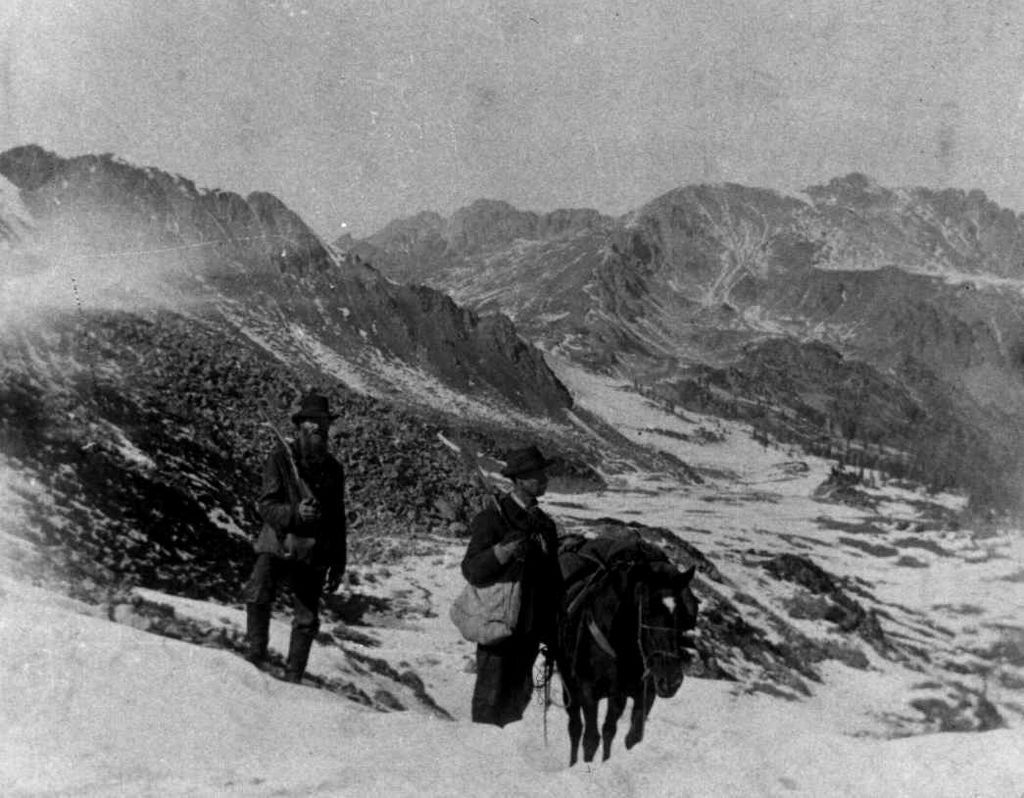 Gold prospectors in the Rocky Mountains of western Kansas Territory. Pike's Peak Country -- Nearly a decade after the hysteria of the California Gold Rush has faded, gold discovered in Pike's Peak Country of western Kansas Territory and southwestern Nebraska has drawn several thousand gold seekers to the Southern Rocky Mountains. William Green Russell, a Georgian who worked the California gold fields in the early 1850s, discovered a small deposit of gold in early July near the mouth of Little Dry Creek which is about 85 miles north of Pike's Peak. The discovery has launched a new frenzy. Gold seekers by the thousands are packing up their belongings and heading to Pike's Peak Country, hoping to reach the area and claim stakes before winter. Most of these prospectors are concentrating their efforts along the South Platte River at the base of the mountains. International News India: Last Rebel Stronghold at Gwalior Falls 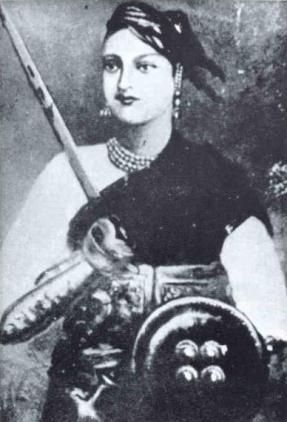 Rani of Jhansi killed in battle near Gwalior Gwalior, Madhya Pradesh -- The British army crushed rebel forces at the Fort of Gwalior, seizing the last rebel stronghold in India. In roughly five months of campaigning, forces under Sir Hugh Rose have traversed Central India, stormed many fortresses, won several victories, and re-established British authority in one of the country's most important provinces. After the fall of Jhansi and Kalphi to the British, the rebel force under Tatya Tope, Rao Sahib and Rani Lakshmibai seized the fort at Gwalior. The Maharajah of Gwalior, who had remained loyal to British rule, was forced to flee. From the fort, rebel forces engaged Sir Hugh Rose's advancing force near Kota-ki-Serai, about four miles southeast of Gwalior. In the ensuing action in intense 104 degree heat, the 8th Hussars made a determined charge through the enemy camp capturing three guns. Rani Lakshmibai was killed and the rebels forced to retreat. Sir Hugh Rose arrived and engaged the enemy before Gwalior on 19 June. The British pursued the rebels through the streets of Lashkar, the new city, and overran the old city at the base of Gwalior Fort. An attack on the main gate was successful and the fort also fell. Tatya Tope and Rao Sahib have not yet been accounted for and are believed either to have been killed or to have escaped. British Reprisals Against Mutineers Severe 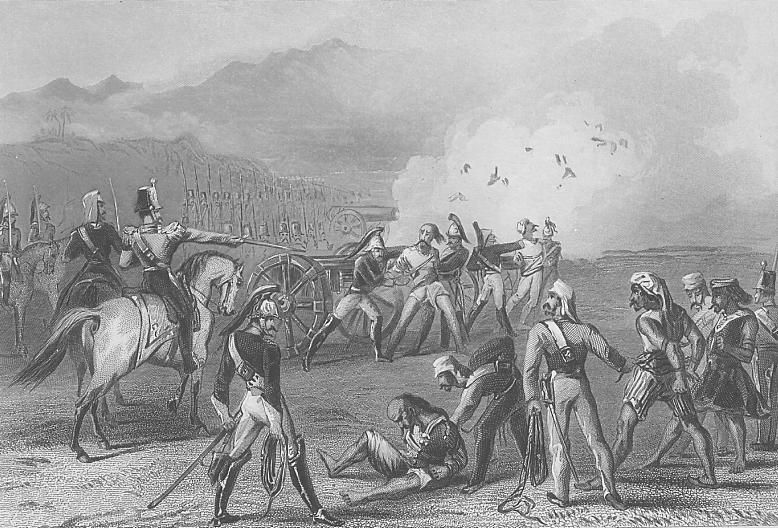 Mutinous Sepoys being blown from the cannon The rebels' murder of women, children and wounded British soldiers at Cawnpore, and the subsequent printing of the events in the British papers, have left many British soldiers seeking revenge. As the British have reclaimed lost territory, they have begun exacting a severe toll on captured rebels. Most are hung. However, the British had some "blown from cannon," an old Mughal punishment adopted many years before in India, in which sentenced rebels were tied over the mouths of cannons and blown to pieces when the cannons were fired. While some have decried the ferocity of the reprisals as "UnChristian" and cruel, most of the British press, outraged by the reports of rape and the killings of civilians and wounded British soldiers, do not advocate clemency of any kind. Governor General Canning has ordered moderation in dealing with native sensibilities which has earned him the scornful sobriquet "Clemency Canning" from the press. A letter published after the fall of Delhi testifies to the scale of the Indian casualties: "All the city's people found within the walls of the city of Delhi when our troops entered were bayoneted on the spot, and the number was considerable, as you may suppose, when I tell you that in some houses forty and fifty people were hiding. These were not mutineers but residents of the city, who trusted to our well-known mild rule for pardon. I am glad to say they were disappointed." Last edited by sflcat61; 05-23-2016 at 07:27 PM. |
|
|

|
|
|
#69 |
|
Minors (Double A)
Join Date: May 2008
Location: South Florida
Posts: 117
|
The Sport
August 1858 The Great Base Ball Game Brooklyn Nine Defeat New York, 16-13 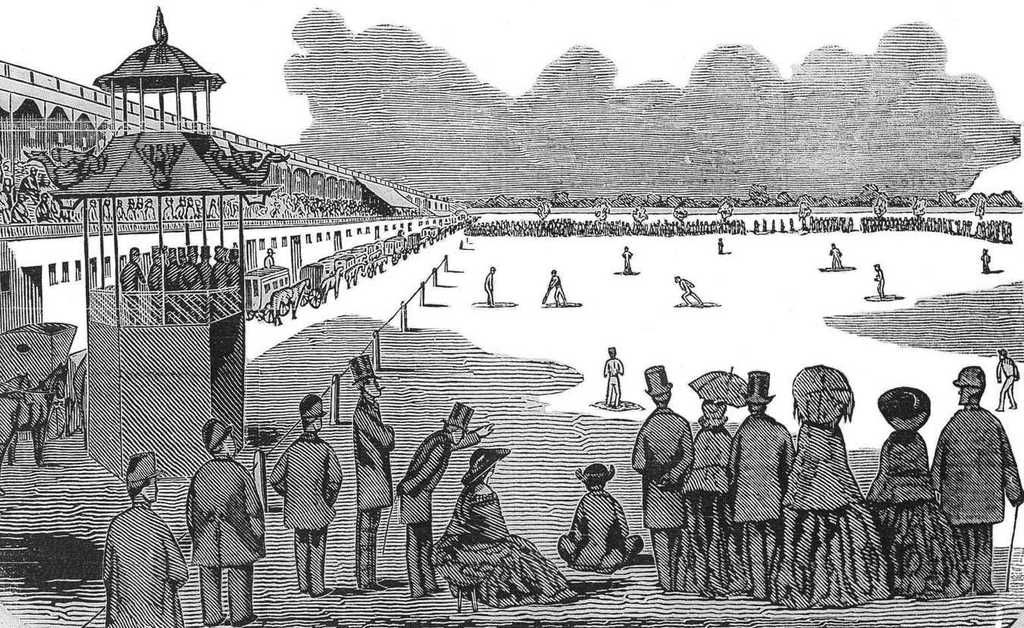 Brooklyn v New York at Fashion Race Course in Queens Queens, New York -- Over 10,000 gathered at the Fashion Race Course near Flushing to watch the first match in a best-of-three series played between picked nines of the best baseball players from New York and Brooklyn. Those who came saw a spirited match in which the Brooklynites triumphed over the New Yorks, 16-13. The New York group consisted of top players from the Knickerbocker, Gotham, Eagle, Empire, Harlem and Union Clubs. Their counterparts in Brooklyn consisted of the best from the Atlantics, Excelsior's, Putnam's and Eckfords. Offensive prowess was apparently a criterion for the Brooklyns as two-thirds of the Brooklyn starters averaged more than three runs a game in 1857. The match marked the first New York area contest to be played on enclosed grounds. A 10 cents admission fee was charged. The fee was used to cover the costs of rent and preparing the courtyard for baseball. The clubs decided that any profit left over after expenses were deducted would be given to the Widows and Orphans Fund of the Fire Departments of New York and Brooklyn. It was as fine a day as the most ardent lover of the game could desire, either for play or for the drive out to witness the match. An immense concourse of people were upon the course before the time announced for commencing the game, and even after the contest had started, people still were streaming in. Every imaginable kind of vehicle had been enlisted in the service, milk carts and wagons, beer wagons, express wagons, stages, and the most stylish private and public carriages. The Excelsior Club figured in a large stage drawn by fourteen handsomely caparisoned horses; the Eagle Club, of Jersey City, boasted an eight horse team, with a band of music; the Pastime eight horses; the Empire two stages, each drawn by six horse; the Putnams and St. Nicholas, each with four-in-hand, while several other Clubs were represented in a more unpretending, but not less enthusiastic manner. Each club's arrival brought cheers from the crowd. Inside, the course was ringed with omnibuses adorned with the colorful banners and flags of all the clubs. A baseball diamond was installed on the race track’s infield—the grassy area enclosed by the perimeter of the race course’s interior fence. It was decided to remove the turf covering this area and lay out a diamond on the bare dirt. The dirt had to be leveled and rolled to provide a proper playing surface. Critics observed that it would have been better if the turf had been left in place and rolled to smooth it out. The first match pitted New York twirler Tom Van Cott, whose brother, Judge W.H. Van Cott, months earlier was chosen to be the President of the National Association, against Mattie O'Brien, Brooklyn's star pitcher and a member of the Brooklyn Atlantics. Judge Van Cott himself served as the Official Scorer for the New York All Stars and Dr. Joseph Jones, president of the Excelsior Club, served in that same capacity for the Brooklyn All Stars. Brooklyn's Holder led the way, scoring five times, with Grum (4 runs), Pete O'Brien (3), and Wadsworth (2) also contributing offensively. New York's catcher Charlie DeBost led the New York side with three runs scored. However, his play at backstop was disappointing as he allowed eight passed balls. Promising newcomer Harry Wright of the Knicks was shut out offensively, but made several athletic catches in the garden that elicited cries of exclamation from the crowd. Van Cott threw 228 pitches, but was topped by Brooklyn’s Mattie O’Brien, who threw 264 pitches in only seven innings. The Brooklynites led 3-0 after one inning, 4-1 after two and 5-2 going to the bottom of the fourth before New York rallied to draw to within one ace, 5-4. After that, the game remained tightly contested as the teams scored equal numbers of runs during the next three innings, with Brooklyn maintaining a slim 10-9 lead as the eighth inning began. Brooklyn then found some timely hitting and New York committed several fielding miscues to allow Brooklyn five aces, while only scoring two in their side of the inning. Brooklyn added a single tally in the ninth, so New York came to bat for the final time trailing 16-11. It looked like New York might rally as Brooklyn made several costly fielding errors that allowed New York to tally two aces and make the score 16-13 with no hands lost. However, the Brooklynites steadied their nerves and retired the next three New York batsmen to take the match. After the match ended, the players and invited guests were ushered up to the Committee rooms where refreshments were provided. Dr. Jones offered the first toast, "Health, success and prosperity to the members of the New York Base Ball Clubs." This was received with all the honors and three times three and a tiger. Judge Van Cott responded in like terms and with much good taste, hoping that the return match might favor New York. This too was followed by three times three and a tiger. Since there were representatives present from Buffalo, Van Cott offered a toast to the health and success of the members of the Niagra Base Ball Club of Buffalo, which was enthusiastically received and responded to by Mr. Williams of that club. Code:
BROOKLYN NEW YORK
Name Hands Runs Name Hands Runs
Leggett, C 4 0 Pinckney, 2b 4 1
Holder, 2b 3 5 Benson, cf 4 2
Pidgeon,ss 3 1 Bixby, 3b 2 1
Grum, cf 3 4 DeBost, c 3 3
P. O'Brien, lf 3 3 Gelston, ss 2 1
Price, 2b 3 1 Wadsworth, 1b 3 1
M. O'Brien, p 3 0 Hoyt, lf 2 2
Masten, 3b 2 0 Van Cott, p 4 2
Burr, rf 3 2 Wright, rf 3 0
27 16 27 13
Brooklyn 3 1 1 0 3 1 1 5 1 -- 16
New York 0 1 1 2 3 1 1 2 2 -- 13
The Sport Distinguishes Between Regional Bat and Ball Games As evidenced by the huge turnout for the Brooklyn-New York match, the popularity of baseball is spreading through the land like a wildfire. Clubs are springing up across the state of New York. There have been reports of clubs being established as far west as San Francisco and as far north as Minnesota. Despite its popularity, we feel it important to point out to our readers that not all of the bat and ball games being played are the same. The rules vary from region to region. We will describe the differences between what we believe are the three main variants being played across this great nation. Baseball aka The New York Game We here at The Sport consider this game to be the most scientific, popular and fastest growing of the bat and ball games being played. It is well on its way to becoming universally recognized as our National Game. The rules were codified by the Knickerbocker Baseball Club in 1845. These Knickerbocker Rules, as they are known by ballists, established the diamond shaped playing field with foul territory outside first and third bases, seven to nine players per side, with nine being the preferred number, and three outs to retire a side during its time batting. The ball is to be delivered to a batsman via an underhanded 'pitch', like in horseshoes. Overhand delivery is not allowed. Outs are made either by catching a hit ball on the fly or the first bound, or by tagging a runner with the ball or throwing it to the base ahead of a runner. The New York Game does not allow players to be put out by being 'plugged' or 'soaked,' where the player running the bases is out if he is hit with a thrown ball. This has led to scientific play in the field. Clubs usually assign three of their most sure-handed players to cover first, second and third base. Thus stationed, these sentinels receive throws from teammates to put runners out when balls are successfully put into play by the batsmen. Originally, the Knickerbocker Rules specified that the first club to tally 21 runs would be the victor, provided each club had the same number of innings at bat. That rule has been modified by the National Association of Base Ball Players. A complete game is now nine innings. Massachusetts Game This variant is played by baseball clubs in New England. There are 11 to 14 players per side. Like the New York game, there are four bases, which are stakes driven into the ground. Unlike the New York game, the field is laid out in a square rather than a diamond. The batsman stands between 1st base and home base. There is no foul area in the field of play and one out retires the side. The ball is delivered to the batsman with an overhand throw rather than an underhand pitch. There is no bound rule and only balls caught on the fly are outs. Runners may also be put out by 'soaking' as they run the bases. A match is won by the first club to score 100 runs, unless both captains agree to a different tally before the game begins. This can lead to games that last several days, which for most observers is too much of a good thing. Town Ball aka Philadelphia Town Ball This variant is popular in Pennsylvania and the Ohio Valley. A team consists of 11 players, unless the clubs agree to some lower number. The only players with assigned positions are the ball-giver and the behind, corresponding to the New York game’s pitcher and catcher. The other players can position themselves as strategy or whim dictates. The bases are five stakes arranged in a circle of approximately thirty feet in diameter. The batter is placed about midway between fifth (or home) and first base. While the Massachusetts game features a swift delivery, which attempts to overpower the batter, Philadelphia Town Ball more closely emulates the New York game's soft toss which is intended merely to put the ball in play. The inning ends when every player on the side has been put out. Outs are made when balls are caught on the fly or first bound. Like in the Massachusetts game, fielded balls thrown at the runner, striking him between bases is also an out. The striker is compelled to make a complete circuit upon each hit in order to score, so while a runner may use a base as a temporary safe haven, he may not remain stranded and must make an attempt to complete the circuit. There is a set batting order, but a successful batter returns immediately to bat, as in cricket, until he is put out. A game is played for a predetermined period of time, generally about four hours. There may be any number of innings within the allotted period. Major Football Match Played In Australia 3-Day Match Between Melbourne Grammar School and Scotch College Ends With 1-1 Deadlock On August 7, 1858 a match between Melbourne Grammar School and Scotch College began at Richmond Paddock in Melbourne, which was co-umpired by Tom Wills and John Macadam and also involved Scotch headmaster Thomas H. Smith. A second day of play took place on August 21 and a third, and final, day on September 4. While the full rules of the match are unknown, the match was played with a round ball, the distance between the goals was approximately half a mile, and there were 40 players per side. The game was declared a draw with each side scoring one goal. The game highlighted Melbourne’s growing interest in playing football. Tom Wills, a renowned cricketer who had recently returned home from England and Rugby School armed with innate knowledge of the rules and ways of the game, was to Melbourne a football wizard. Wills has been regularly promoting the idea of organized football in the colony of Victoria as an ideal way for cricketers to stay active during the offseason. National Association Results Code:
10 June – Putnam Brooklyn defeated Excelsior Brooklyn, 31-18
17 June – Atlantic Brooklyn defeated Putnam Brooklyn, 17-13
24 June – Excelsior Brooklyn defeated Eagle NY, 35-8
07 July – Putnam Brooklyn defeated St. Nicholas NY, 45-19
08 July – Excelsior Brooklyn defeated Knickerbocker NY, 24-22
Continental Brooklyn defeated Metropolitan NY, 32-25
15 July – Osceola Brooklyn defeated Nassau Brooklyn, 41-29
17 July – Empire NY defeated St. Nicholas NY, 30-13
21 July – Empire NY defeated Empire Newark, 27-7
Harlem NY defeated Baltic NY, 46-24
Metropolitan NY defeated Manhattan NY, 46-19
22 July – Excelsior Brooklyn defeated Union Morrisiana, 30-18
28 July – Continental Brooklyn defeated Baltic NY, 21-15
29 July – Eagle NY defeated Knickerbocker NY, 45-18
Mutual NY defeated Monument NY, 73-10
31 July – Hiawatha Brooklyn defeated Osceola Brooklyn, 27-18
Code:
10 June – Winthrop Holliston defeated Olympic Boston, 100-27
17 June – Green Mountain Boston defeated Olympic Boston, 100-45
24 June – Takewambait Natick defeated Yankee Natick, 105-89
Rough-and-Ready Boston defeated Bunker Hill Boston, 100-22
Bay State Boston defeated American Boston 101-71
04 July – Bunker Hill Boston defeated Rough-and-Ready Boston, 100-91
Olympic Boston defeated Hancock Boston, 100-64
21 July – Green Mountain Boston defeated Winthrop Holliston 112-68
Bay State Boston defeated American Boston, 100-89
22 July – Green Mountain Boston defeated Bay State Boston, 100-23
29 July – Olympic Boston defeated American Boston, 101-58
31 July – Winthrop Holliston defeated Alpha Ashland, 103-63
Code:
05 April – Philadelphia defeated Delphian by 6 Wickets 15 April – St. George defeated Philadelphia by 50 runs 05 May – Philadelphia defeated Young America by 84 runs 10 June – St. George defeated Brooklyn by an innings and 40 runs 16 June – Boston defeated Roxbury by 6 Wickets 05 July – English Residents defeated American Born by 13 runs Last edited by sflcat61; 06-12-2016 at 12:39 PM. |
|
|

|
|
|
#70 |
|
Minors (Double A)
Join Date: May 2008
Location: South Florida
Posts: 117
|
The Republic
September 1858 National News Trans-Atlantic Telegraph Cable Completed President Buchanon and Queen Victoria Exchange Messages. 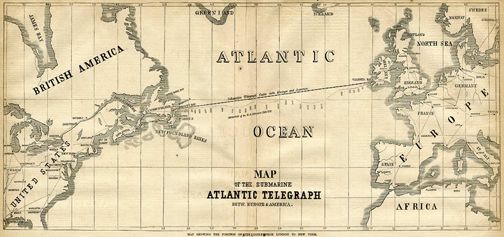 Map of the Atlantic Telegraph Cable 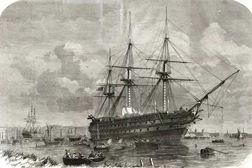 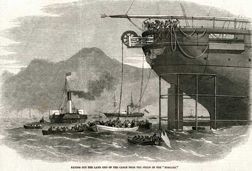 The Agamemnon (l); Paying out cable from stern of the Niagra (r) 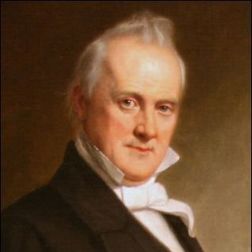 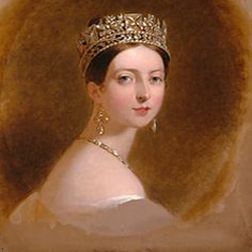 President Buchanon (l); Queen Victoria (r) After several unsuccessful attempts, the first telegraph line across the Atlantic Ocean was completed in August, a feat accomplished largely through the efforts of American merchant Cyrus West Field. The telegraph was first developed by Samuel F. B. Morse, an artist-turned-inventor who conceived of the idea of the electric telegraph in 1832. Several European inventors had proposed such a device, but Morse worked independently and by the mid 1830s had built a working telegraph instrument. In the late 1830s, he perfected Morse Code, a set of signals that could represent language in telegraph messages. In May 1844, Morse inaugurated the world’s first commercial telegraph line with the message “What hath God wrought,” sent from the U.S. Capitol to a railroad station in Baltimore. During the past decade, more than 20,000 miles of telegraph cable have been hung, crisscrossing the country. The rapid communication it has made possible has greatly aided American expansion, providing a boost to business conducted across the great distances of a growing United States. In 1854, Cyrus West Field conceived the idea of the telegraph cable and secured a charter to lay a well-insulated line across the floor of the Atlantic Ocean. Obtaining the aid of British and American naval ships, he made four unsuccessful attempts, beginning in 1857. In July 1858, four British and American vessels–the Agamemnon, the Valorous, the Niagara, and the Gorgon–met in mid-ocean for the fifth attempt. On July 29, the Niagara and the Gorgon, with their load of cable, departed for Trinity Bay, Newfoundland, while the Agamemnon and theValorous embarked for Valentia, Ireland. By August 5, the cable had been successfully laid, stretching nearly 2,000 miles across the Atlantic at a depth often of more than two miles. On August 16, President James Buchanan and Queen Victoria exchanged formal introductory and complimentary messages. The Queen's message read, "Her Majesty desires to congratulate the President upon the successful completion of this great international work, in which the Queen has taken the deepest interest. The Queen is convinced that the President will join with her in fervently hoping that the Electric Cable which now connects Great Britain with the United States will prove an additional link between the nations whose friendship is founded upon their common interest and reciprocal esteem. The Queen has much pleasure in thus communicating with the President, and renewing to him her wishes for the prosperity of the United States." President Buchanon responded, "it is a triumph more glorious, because far more useful to mankind, than was ever won by conqueror on the field of battle. May the Atlantic telegraph, under the blessing of Heaven, prove to be a bond of perpetual peace and friendship between the kindred nations, and an instrument destined by Divine Providence to diffuse religion, civilization, liberty, and law throughout the world." The morning after this historic trans-Atlantic exchange, a grand salute of 100 guns resounded in New York City, the streets were decorated with flags, the bells of the churches were rung, and at night the city was illuminated. Postal Service Begins Regular Mail Service to Pacific Coast The U.S. Postal Department in August announced a regular schedule of overland delivery of mail to California. The service is scheduled to begin in September after a contract was awarded to John Butterfield’s Overland Mail Company. The company will use the 2,800-mile southern stage route between Tipton, Missouri, and San Francisco. The specified running time will be 24 days. Up to this point, the Post Office Department has depended on contracts with two steamship companies to carry mail between New York and California. Mail traveled by ship from New York to Panama, was moved across Panama by canoes and mules, then went on to San Francisco by ship. The completion of the Panama Railroad in 1855 eased transit across the isthmus. As early as 1848, some overland mail reached California, if erratically, via the military. The mail was carried by the military between Fort Leavenworth and Santa Fe. Public Mailboxes Installed Placed on the streets of New York and Boston. Albert Potts, a Philadelphia iron products manufacturer, saw his Post Office Department sanctioned mailboxes incorporated onto existing street side lampposts in New York and Boston during August. New lampposts with pre-fitted mailboxes will be provided to the cities by his firm. Potts patented his mail box design in March. Politics: Election 1858 -- Lincoln and Douglas Debate for Illinois Senate Seat 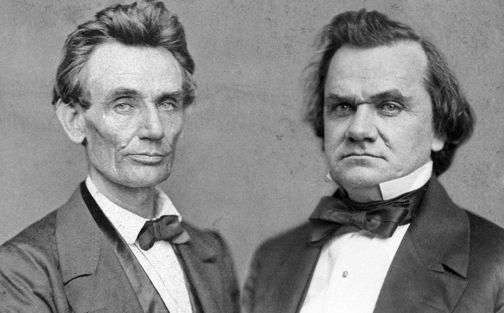 Abraham Lincoln (l) and Stephen Douglas (r) During August, Senate hopeful Abraham Lincoln and incumbent Stephen Douglas met for the first of seven scheduled debates. This race has gained national interest because of the increasing national divide over the issue of slavery. Lincoln, a former Whig, has become the face of the new Republican Party, which increasingly has been linked by political opponents to the Abolitionist movement. In 1846, Lincoln was elected and served a two-year term as a Whig in the House of Representatives. While not an outspoken advocate of slavery or its expansion, Democrat Douglas is a strong promoter of his idea of popular sovereignty, which allows the people of a territory to decide for themselves whether to allow slavery. It was Douglas's Kansas–Nebraska Act of 1854 that repealed the Missouri Compromise's ban on slavery in the territories of Kansas and Nebraska, and replaced it with the doctrine of popular sovereignty. Davis is seeking re-election for a third term in the U.S. Senate. The first debate took place in Ottawa, Illinois and as expected the main theme of the debate was slavery. Lincoln said that popular sovereignty would nationalize and perpetuate slavery. Douglas argued that both Whigs and Democrats believed in popular sovereignty and that the Compromise of 1850 was an example of this. Lincoln said that the national policy was to limit the spread of slavery, and mentioned the Northwest Ordinance of 1787, which banned slavery from a large part of the Western territories. The Compromise of 1850 allowed the territories of Utah and New Mexico to decide for or against slavery, but it also allowed the admission of California as a free state, reduced the size of the slave state of Texas by adjusting the boundary, and ended the slave trade (but not slavery itself) in the District of Columbia. In return, the South got a stronger fugitive slave law than the version mentioned in the Constitution. Whereas Douglas said that the Compromise of 1850 replaced the Missouri Compromise ban on slavery in the Louisiana Purchase territory north and west of the state of Missouri, Lincoln countered that this was false, and that Popular Sovereignty and the Dred Scott decision were a departure from the policies of the past and would nationalize slavery. Douglas accused Lincoln of being a member of the "Black Republican" party, and an abolitionist. Douglas cited as proof Lincoln's House Divided Speech in which he said, "I believe this government cannot endure permanently half Slave and half Free." Douglas said that uniformity in the local laws and institutions of the different States is neither possible or desirable. He also accused Lincoln of wanting to confer the rights and privileges of citizenship on negroes and allow masses of freed negroes to flow into States like Illinois (which has in place laws excluding blacks, free or slave) turning them into negro colonies. Douglas received loud cheers when he said he was opposed to negro citizenship in every form. He continued by saying that the States should each have the power to end or continue slavery as they wish and to adhere to the principle of self-government, upon which the institutions of our nation were based. He said he feared the doctrine put forth by Lincoln would dissolve the Union if successful and that the Republicans were trying to excite a sectional war between the free States and the slave States. Lincoln said he did not argue for complete social equality. However, he did say Douglas ignored the basic humanity of blacks, and that slaves did have an equal right to liberty. Lincoln said, "I agree with Judge Douglas he (the negro) is not my equal in many respects—certainly not in color, perhaps not in moral or intellectual endowment. But in the right to eat the bread, without the leave of anybody else, which his own hand earns, he is my equal and the equal of Judge Douglas, and the equal of every living man." Lincoln said he hated the "real zeal for the spread of slavery," saying he hated it because of the 'monstrous injustice of slavery itself.' He also said slavery deprives our nation's republican example of its just influence in the world—because it enabled the enemies of free institutions, with plausibility, to taunt the United States as hypocrites, caused the real friends of freedom to doubt our sincerity, and forced many good men into an open war with the very fundamental principles of civil liberty. Lincoln said he himself did not know how emancipation should happen. He believed in colonization, but admitted that this was impractical. Without colonization he said that it would be wrong for emancipated slaves to be treated as "underlings," but that there was a large opposition to social and political equality, and that "a universal feeling, whether well or ill-founded, cannot be safely disregarded." Lincoln said that Douglas' public indifference to slavery would result in the expansion of slavery because it would mold public sentiment to accept slavery. Lincoln said Douglas "cares not whether slavery is voted down or voted up," and that, in the words of Henry Clay, he would "blow out the moral lights around us" and eradicate the love of liberty. Lincoln asked Douglas to reconcile popular sovereignty with the Supreme Court's Dred Scott decision. Douglas responded that the people of a territory could keep slavery out even though the Supreme Court said that the federal government had no authority to exclude slavery, simply by refusing to pass a slave code and other legislation needed to protect slavery. Around the Nation August 17 --Charles Reed Bishop, who had immigrated to the island of Hawaii from upstate New York a decade earlier, and his partner, William A. Aldrich, opened Bishop & Co. -- a banking partnership that will operate under the laws of the independent Kingdom of Hawaii. August 24 - Richmond (Virginia) "Daily Dispatch" reports 90 blacks arrested for learning International News East India Company Dissolved Control of India Turned over to the Crown. The Government of India Act 1858 was passed by the Parliament of the United Kingdom (21 & 22 Vict. c. 106) in early August. Its provisions called for the liquidation of the British East India Company, that had been ruling British India under the auspices of Parliament, and transferred those functions to the British Crown. Lord Palmerston, Prime Minister of the United Kingdom, introduced the bill, referring to the grave defects in the existing system of the governing of India which led to the Indian Rebellion of 1857. He urged Parliament to pass the bill to calm down the after-effects of 1857 revolt. The Act effectively dissolves the East India Company. The Company's territories and assets in India will be transferred to the Queen, and the Company will cease to exercise its power and control over these territories. The Crown will also assume the responsibilities of the Company as they pertain to treaties, contracts, and so forth. The Queen's Principal Secretary of State receives the powers and duties of the Company's Court of Directors. A council of fifteen members will be appointed to assist the Secretary of State for India. The council will serve as an advisory body in India affairs. For all the communications between Britain and India, the Secretary of State becomes the primary channel. The Crown will be empowered to appoint a Governor-General and the Governors of the Presidencies on the sub-continent. Also, an Indian Civil Service department will be created under the control of the Secretary of State. Mountaineers Scale west flank of Eiger. 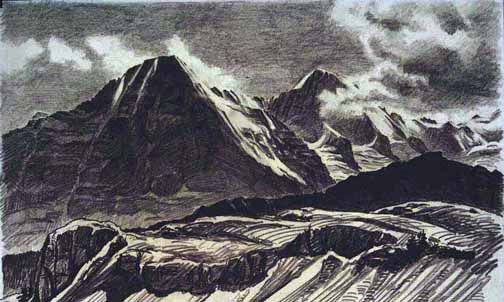 The Eiger in the Bernese Alps Swiss guides Christian Almer and Peter Bohren and Irishman Charles Barrington, became the first men to climb the west flank of the Eiger on August 11. The Eiger is a 13,020 ft. mountain of the Bernese Alps, overlooking Grindelwald and Lauterbrunnen in the Bernese Oberland, just north of the main watershed and border with Valais. Last edited by sflcat61; 08-29-2016 at 04:14 PM. |
|
|

|
|
|
#71 |
|
Minors (Double A)
Join Date: May 2008
Location: South Florida
Posts: 117
|
The Sport
September 1858 Brooklyn Wins Fashion Race Course Series Brooklyn Nine Defeats New York, 25-18 Queens, New York -- The Picked-Nine of Brooklyn showed themselves to be the best in baseball as they defeated their New York counterparts 25-18 in the second game of a best-of-three series at the Fashion Race Course near Flushing. The win allowed Brooklyn to clinch the series played between the best baseball players from New York and Brooklyn. The attendance was less than on the first occasion a few weeks ago but still numbered between 8,000 and 9,000. Play began at 2:30 p.m. and from the very beginning, luck seemed all on the side of the Brooklyn nine, who went in first and scored five runs. The New-Yorkers were given nothing during their side of the innings. The next innings saw Brooklyn score three runs and the New Yorkers finally came to life scoring six. In the third, Brooklyn made five, New-York two. The fourth innings gave Brooklyn five to their opponents' none! The gentlemen with money declined giving the long odds on New York about this time. The fifth innings gave Brooklyn four; New-York six. The next innings, a goose egg to the Long-Islanders' one. The seventh innings gave Brooklyn three runs; New York one. The eighth, Brooklyn one; New-York two. The last, Brooklyn one; New-York none-thus making the score, for Brooklyn 25 runs; for New-York 18. The play was the best on the Brooklyn side. The New Yorkers' fielding was very indifferent in the beginning, and did not grow better until about the sixth innings – too late to retrieve the fortunes of the day. The Brooklyn Nine's fielding began strong, but lapsed at times, allowing New York to tally six runs twice. The pitching was good on both sides, but the catching for Brooklyn by Marten was better than that for New York, by De Bost, who allowed several costly passed balls. The largest score made was five runs by J. Grum, who also helped secure the Brooklyn victory with a three-run homer in the seventh inning, the only home run hit in the series. Both nines juggled their lineups a bit from the first game. The players were as follows: Code:
BROOKLYN NEW-YORK Marten, Catcher Gelston, Short Pidgeon, Pitcher Pinckney, Second base Price, First base Bixby, First base Oliver, Second base Marsh, Third base M. O'Brien, Third base De Bost, Catcher R. Pierce, Short Hoyt, Right field J. Greene, Right field Turner, Left field P.O. O'Brien, Center field Davis, Center field Manot, Left field Van Cott, Pitcher Brooklyn 5 3 5 3 4 0 3 1 1 -- 25 New York 0 6 2 0 6 1 1 2 0 -- 18 Actual score: Brooklyn 29; New York 8 National Association Results 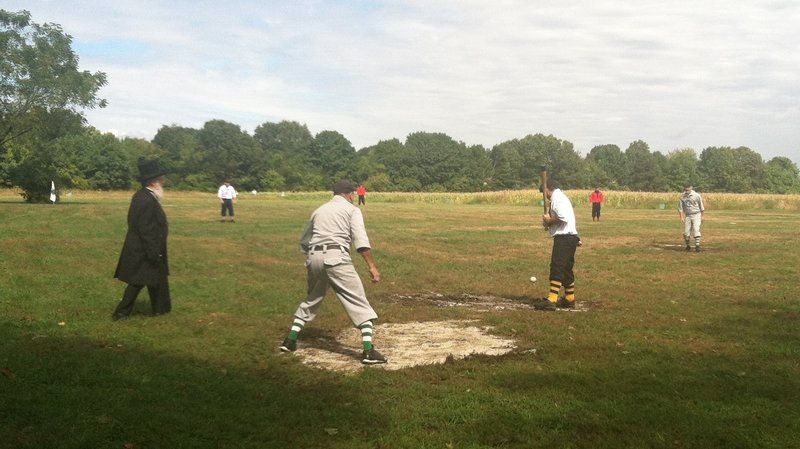 Code:
August 2 --------- Oriental (New York) 5 4 2 4 3 1 6 3 3 -- 31 Metropolitan (New York) 0 2 1 2 0 1 2 1 0 -- 9 at Oriental grounds at corner of Bedford & Lee August 4 --------- Enterprise (Bedford) 1 1 4 3 1 4 2 0 4 -- 20 Northstar 1 1 2 0 2 1 1 1 2 -- 11 at Enterprise grounds, Bedford Washington (Brooklyn) 12 2 3 5 5 5 4 10 3 –- 49 Arctic (Brooklyn) 2 0 3 4 5 2 4 5 4 -- 29 at Arctic grounds at corner of Penn and Bedford August 5 --------- Harlem (New York) 4 4 0 0 0 0 4 4 3 -- 19 Excelsior (Brooklyn) 3 2 0 0 8 2 4 0 3 -- 22 at Harlem grounds, Mount Morris Union (Morrisania) 1 5 3 6 0 10 4 5 5 -- 39 Adriatic (Newark) 10 3 4 0 4 3 4 4 0 -- 32 at Union grounds near Melrose railroad station Atlantic (Brooklyn) 2 0 2 -- 4 Eckford (Brooklyn) 0 0 0 -- 0 at Atlantic grounds, Bedford, LI *ball lost; game halted after 3 innings, resulting in a draw game. August 7 --------- Resolute (Brooklyn) 3 3 0 0 0 3 3 0 0 -- 12 Niagra (Brooklyn) 3 4 0 0 2 0 4 3 3 –- 19 At Resolute grounds in Brooklyn August 9 --------- Mutual (New York) 4 4 3 4 0 2 4 4 3 -- 28 St. Nicholas (New York) 3 0 3 0 1 0 3 0 0 -- 10 At Hoboken August 11 --------- Harlem (New York) 2 0 2 2 1 4 0 2 4 -- 17 St. Nicholas (New York) 0 2 0 0 1 1 2 1 2 –- 9 At 124th St. and 5th Ave. August 12 --------- Nassau (Brooklyn) 3 2 2 3 0 0 1 3 3 -- 17 Osceola (Brooklyn) 2 1 2 0 0 2 0 3 1 –- 11 At Wheat Hill, Brooklyn August 13 --------- Gotham (New York) 5 1 3 5 3 1 3 0 1 -- 22 Eckford (Brooklyn) 2 4 5 4 3 0 3 3 X –- 24 At Eckford grounds, Greenpoint, LI August 16 --------- Pastime (Brooklyn) 1 3 1 3 3 3 3 3 4 -- 24 Nassau (Brooklyn) 4 4 1 3 2 1 4 2 0 -- 21 August 17 --------- All Brooklyn Nine 5 3 5 3 4 0 3 1 1 -- 25 All New York Nine 0 6 2 0 6 1 1 2 0 -- 18 at Fashion Race Course, Flushing August 18 --------- Baltic (New York) 3 2 1 2 6 3 4 0 3 6 -- 30 Newark (Newark) 2 0 3 2 10 1 1 4 1 1 -- 25 at Newark August 20 --------- Excelsior (Brooklyn) 0 1 1 4 1 1 0 3 5 -- 15 Knickerbocker (NY) 3 2 0 0 2 3 8 2 x -- 20 at Hoboken Empire (New York) 3 2 2 3 6 5 4 2 2 -- 29 Eagle (New York) 1 3 2 4 1 2 4 1 0 -- 18 at Hoboken Washington 1 4 0 6 -- 11 Arctic 1 2 2 3 -- 8 at Washington grounds, corner of Gates and Grand Avenues *game suspended by umpire during 5th innings due to a shower, resulting in a draw game. Continental (Brooklyn) 4 0 5 6 2 7 8 1 7 -- 40 Nassau (Brooklyn) 8 1 4 2 1 2 7 5 4 -- 34 at Wheat Hill August 23 --------- Mutual (New York) 0 2 3 6 4 2 0 4 5 -- 26 Baltic (New York) 1 0 0 0 3 6 2 4 0 -- 16 at Elysian Fields, Hoboken August 24 --------- Metropolitan (NY) 5 2 2 2 1 2 2 2 2 -- 20 Continental (NY) 2 0 1 3 2 2 2 1 2 -- 15 at Elysian Fields, Hoboken August 25 --------- Eagle (NY) 0 1 6 3 8 1 0 4 4 -- 27 St. Nicholas (NY) 1 1 0 0 3 3 2 2 1 -- 13 at Elysian Fields, Hoboken August 26 --------- Mutual (New York) 3 4 0 2 4 8 1 3 0 -- 25 Independent 1 4 1 3 6 1 2 1 1 -- 17 August 29 --------- Eagle (New York) 0 0 5 0 4 3 2 5 3 -- 22 Sylvia (Brooklyn) 0 1 2 2 2 2 3 1 5 -- 18 at Sylvia grounds, corner of Marcy Ave. and Penn St. August 30 --------- Eckford (Brooklyn) 3 1 8 0 3 2 0 1 3 -- 21 Gotham (New York) 0 0 0 0 4 2 1 0 2 -- 9 at Eckford grounds, Greenpoint, LI 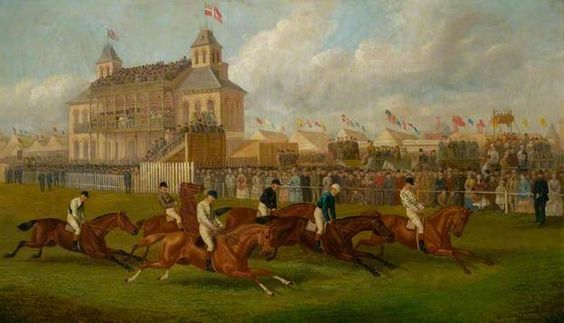 Epsom Derby at Epson Downs -- Winner: Beadsman ridden by John Wells; trained by George Manning; owned by Sir Joseph Hawley. Epson Oaks at Epson Downs – Winner: Governess ridden by Tom Ashamall; trained by Tom Eskrett; owned by William Gratwicke Last edited by sflcat61; 10-26-2016 at 04:57 PM. |
|
|

|
|
|
#72 |
|
Minors (Double A)
Join Date: May 2008
Location: South Florida
Posts: 117
|
The Republic
October 1858 International News French Forces Attack Vietnam 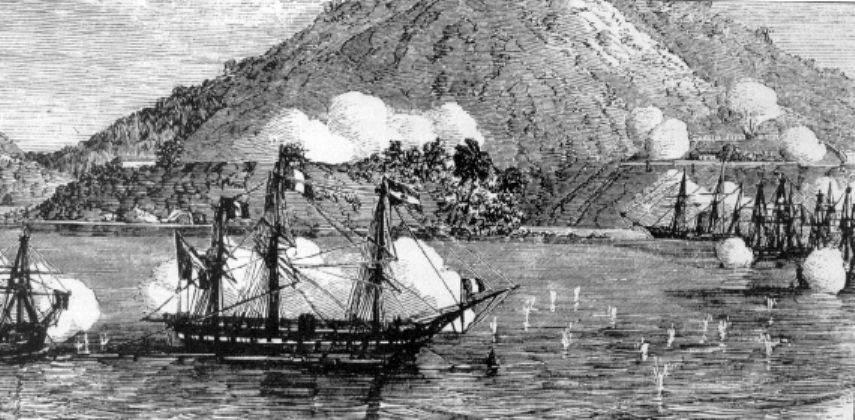 French ships bombard forts along the coast of Tien Sa peninsula 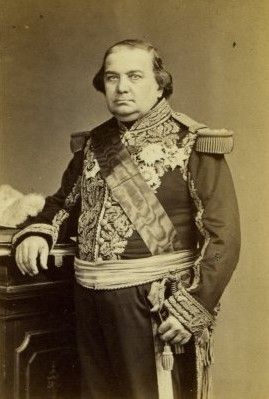 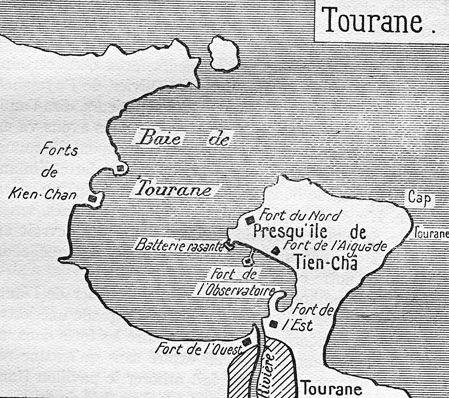 (l ) Admiral Charles Rigault de Genouilly; (r ) Map of southern Tourane (Vietnam) Admiral Charles Rigault de Genouilly attacked Vietnam under the orders of Napoleon III following the failed mission of diplomat Charles de Montigny. De Montigny visited Vietnam in 1857 to demand the establishment of a consulate in Huế, freedom to trade and to preach, and an end to persecution against Catholics. However, the Vietnamese court rejected all of his demands. This rejection and the continued persecution and harassment of Catholic missionaries in Vietnam by the emperors Minh Mạng and Thiệu Trị have led to the French offensive. For the campaign against Vietnam, Rigault de Genouilly controls a force of 14 warships, 1,000 French marine infantry, and 1,000 troops from the Spanish garrisons of the Philippines (550 Spanish infantry and 450 Filipino light infantry). The allied expedition arrived off the entrance to Tourane Bay at nightfall on 31 August. At dawn on 1 September the warships took up positions facing the five Vietnamese forts on the Tien Sa peninsula. During the morning of 1 September Admiral Rigault de Genouilly summoned the Vietnamese to hand over the forts within two hours. The summons was taken ashore by a French staff officer and laid at the entrance to the Fort de l'Aiguade. No response was received within the stipulated period, and the French admiral ordered the allied flotilla to open fire, hoisting a French flag at the main mast of Némésis and a Spanish flag at the mizzen mast. The Vietnamese response was feeble, and none of the allied ships suffered any damage. Rigault de Genouilly then put ashore the landing companies of Némésis, Primauguet and Phlégéton, under the orders of capitaine de vaisseau Reynaud. The sailors captured their first objective, the Fort de l'Aiguade, with little trouble, charging into the Vietnamese positions with cries of 'Vive l'Empereur!' Rigault de Genouilly's summons was found on a table inside the fort, unopened. The attackers also overran a Vietnamese shore battery a little to the west of the fort. National News Transatlantic Cable Fails The Transatlantic cable apparently has failed after three weeks of operation, as communication between the United States and United Kingdom has been lost. Its failure has caused a wide range of reactions. Some writers have hinted that the line itself was a mere hoax, and others pronounced it a stock exchange speculation. In the initial enquiry into the failure, Dr. Whitehouse, the project's Chief Electrician, was deemed responsible. While he is an English surgeon and an avid electrical experimenter, he had no prior professional experience when Cyrus West Field brought him aboard. Field and his company (Atlantic Telegraphy Company) also received criticism for employing an electrical engineer with no recognized professional qualifications. Field is said to be undaunted by the failure. He is eager to renew the work, but there are indicators that the public had lost confidence in the scheme. Field's efforts to revive the company and attract capital have been futile up to this point. Tragedy Strikes: Austria catches fire and sinks A Hamburg-America company liner, the RMS Austria, making a North Atlantic crossing to Halifax caught fire and sank with all 471 aboard dying. Astronomer Discovers Asteroid A new asteroid was discovered by American astronomer and Catholic priest George Mary Searle on September 10, from the Dudley Observatory near Albany, NY. The newly discovered asteroid will be called Pandora, after the first woman in Greek mythology, who unwisely opened a box that released evil into the world. The name was apparently chosen by Blandina Dudley, widow of the founder of the Dudley Observatory. 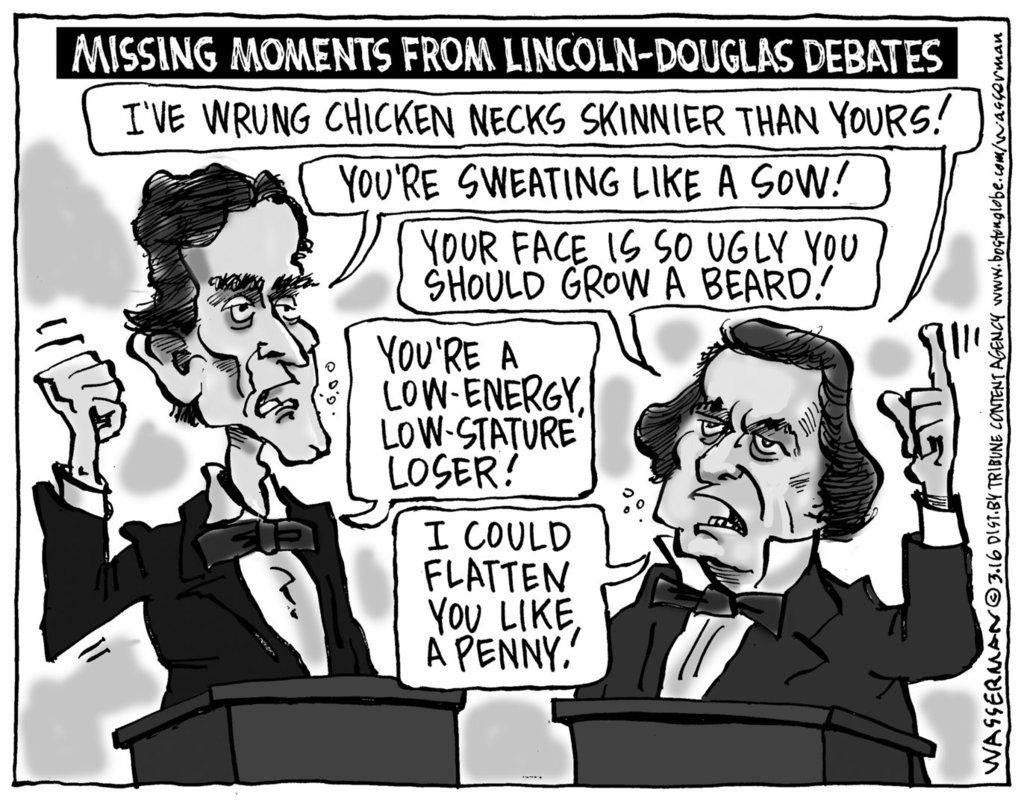
Last edited by sflcat61; 11-20-2016 at 04:08 PM. |
|
|

|
|
|
#73 |
|
Minors (Double A)
Join Date: May 2008
Location: South Florida
Posts: 117
|
The Sport
October 1858 USA Cricketers Defeat Canada 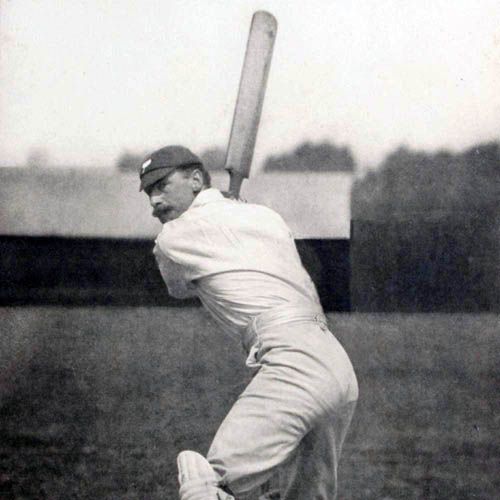 Hoboken -- A collection of the best cricket players from New York, Philadelphia, Washington and Boston met a similarly composed squad from Canada at the Elysian Field cricket grounds in New Jersey. The result of the three day affair was a win by the United States as they defeated Canada by six wickets. James Higham and Henry Sharp led the way for the United Sates with 38 and 30 runs respectively. Code:
BOXSCORE CANADA VS. USA
VENUE: FOX HILL CRICKET GROUNDS AT HOBOKEN, NJ
USA WINS THE MATCH BY 6 WICKETS
-------------------------------------------
CANADA FIRST INNINGS
H Phillips 1 bowled Hallis
JC Rykert 4 bowled Hallis
TD Phillips 6 bowled Marsh
JO Heward 31 not out
B Parsons 1 caught Wright b Hallis
S Hardinge 5 caught Crossley b Marsh
Head 10 caught Higham b Crossley
Peerless 0 bowled Hallis
Sneath 7 bowled Marsh
WH Napier 0 bowled Marsh
F Foudrinier 0 bowled Marsh
EXTRAS
NB: 1
WIDES: 9
LB: 4
BYES: 3
CANADA ALL OUT FOR 81 IN 77.3 OVERS
USA BOWLING
O M R W
Hallis 39.0 24 24 4
Marsh 29.1 16 27 5
Crossley 9.2 5 13 1
---------------------------------------------
USA FIRST INNINGS
HE Sharp 24 caught Peerless b Head
R Waller 2 caught Peerless b Hardinge
HCW Bingham 34 caught Peerless b Hardinge
T Senior 9 caught TD Phillips b Hardinge
W Wilby 0 bowled Hardinge
AL Marsh 0 bowled Head
WH Wright 0 bowled Hardinge
J Higham 5 caught TD Phillips b Hardinge
Jefferson 0 caught H Phillips b Parsons
W Crossley 16 not out
Richardson 9 caught Peerless b Hardinge
EXTRAS
NB: 9
WIDES: 14
LB: 6
BYES: 14
USA ALL OUT FOR 137 IN 73.1 OVERS
CANADA BOWLING
O M R W
Head 22.0 9 16 2
Hardinge 29.1 12 42 7
Parsons 17.0 5 23 1
Napier 3.0 1 9 0
Peerless 2.0 0 4 0
-------------------------------------------
CANADA SECOND INNINGS
JO Heward 5 bowled Hallis
TD Phillips 6 bowled Hallis
WH Napier 7 caught Sharp b Hallis
B Parsons 1 bowled Hallis
H Phillips 17 bowled Senior
S Hardinge 12 bowled Hallis
Sneath 4 bowled Senior
JC Rykert 11 run out
Head 10 not out
Peerless 0 run out
F Foudriner 0 bowled Marsh
EXTRAS
NB: 3
WIDES: 6
LB: 3
BYES: 19
CANADA ALL OUT FOR 104/10 IN 68.4 OVERS
USA BOWLING
O M R W
Hallis 32.2 15 28 5
Marsh 20.0 9 23 1
Crossley 2.1 0 5 0
Senior 14.1 4 17 2
-------------------------------------------
USA SECOND INNINGS
R Waller 14 bowled Hardinge
T.M. Hall 4 caught Parsons b Head
W Wilby 12 bowled Head
HCW Bingham 4 lbw b Hardinge
HE Sharp 6 not out
T Senior Did Not Bat
WH Wright Did Not Bat
J Higham Did Not Bat
Jefferson Did Not Bat
W Crossley Did Not Bat
W Hallis Did Not Bat
EXTRAS
NB: 0
WIDES: 1
LB: 5
BYES: 3
USA 49/4 IN 28.3 OVERS
CANADA BOWLING
O M R W
Head 14.1 7 21 2
Hardinge 14.2 5 19 2
Cricket News Interesting Match to Come – The Kings County Club is growing quite ‘plucky’ – not to say “cheeky” on their successes during the present season. They have now challenged eleven of the N.Y. to play against sixteen of K.C.C.C. The challenge has been accepted. The match to come off in all this month, the day not yet fixed. Considering the youth of our County Club, this is a bold strike since New York is acknowledged generally as the best in the United States. It is the oldest operating club excepting the St. George’s, and has so often whipped the elder association that the latter has of late been shy of meeting it. The sixteen to contend in the forthcoming match on the part of Kings County are Bailey, Bray, Lester, Haggis, Nash, Phillips, Sharman, Stacey, Kesling, Parker, James, Davis, Hez’h. Russell, Oates, Porter and Throngton, with the following “reserve” – Brooks, Applin, Alvey, Allen, Roberts, Tom Dumbeldow, J.C. Force. Cricket and Baseball central to New York City’s Central Park Manhattan -- Construction of Central Park in Manhattan is progressing on schedule. On the southern end, where the grand Promenade or the Cathedral Walk is laid out, the work is in advanced stage. West of the Cathedral Walk, the cricket and baseball ground, which has very properly been first attended to, as it will be the most beneficial to the public, has been leveled and is ready to be laid down in turf. This piece of the park, 14 acres of it, will be in order next spring when the Grand Promenade with the Terrace and the steps leading to the lake will also be finished. More than 12 months labor of nearly three thousand men on an enclosure of less than eight hundred acres should produce some very marked results. A system of drainage was adopted, roads laid out and the foundations laid for the erection of the future superstructure which is to endure for centuries and be the play grounds of the great grandchildren of the present generation. 7 miles of stone wall has been built but it is not very imposing in its presence because only a small portion of it is seen at a time. The 15 miles of earthen drainage pipes make no show whatever – they are 10 to 15 feet below the surface of the ground. The laborers are allowed 45 minutes for dinner and are summoned to work by ringing the great bell. They receive 90 cents a day for nine hours of work. Superintendents are paid $1.75 for the same duration. Expenditure for labor is in the range of $1000 a day. On the Upper Reservoir, there are another 1200 employed for more hours of work. Altogether, there are 4000 men at work within the enclosure of the park. Baseball News: Atlantic Hammers Excelsior, 33-21 Brooklyn – The best nine in baseball continued their unbeaten streak, as the Atlantics of Brooklyn defeated the Excelsiors of Brooklyn 33-21 at the Bedford Grounds on Long Island. Atlantic opened the game with an impressive 8 tallies in the first innings highlighted by John Price’s four-run homerun. Mattie O’Brien then stepped into the pitcher’s square and delivered a goose-egg to the Excelsiors during their time at the bat. By the conclusion of the fourth innings, it appeared that Atlantic had the game in hand, leading 23-5. However, the Atlantic bats were silenced over the next couple of innings thanks to some stellar play in the field by Excelsior including a diving catch of a ball on the fly by center fielder Sam Kissam that robbed Atlantics’ Tice Hamilton of a hit in the fifth innings. By the end of the sixth innings, the Excelsiors had narrowed the Atlantics’ lead 23-13. However, during the top of the seventh, Atlantic found their offense again, plating 10 runs in the final three innings. Price led the Atlantics with six runs scored. For Excelsior, Bill Young led the way with four runs scored. Code:
September 2 ------------- Atlantic 8 3 8 4 0 0 4 3 3 - 33 Excelsior 0 1 1 3 4 4 5 2 1 - 21  Code:
September 3 ------------- Empire 4 3 2 1 1 2 4 3 2 - 22 Gotham 1 0 1 2 1 3 2 1 0 - 11 At Elysian Fields Continental 3 3 4 2 9 1 4 4 0 - 30 Eckford 2 4 0 0 1 2 2 2 3 - 16 Wheat Hill September 4 ------------- Atlantic 1 4 1 3 4 4 1 4 2 - 24 Continental 4 4 1 0 1 2 1 0 3 - 16 At Bedford grounds, L.I. Eckford 4 2 1 2 3 8 0 1 2 - 23 Putnam 1 1 1 0 1 0 0 0 2 - 6 September 8 ------------- Eckford 1 6 2 4 1 2 4 1 6 - 27 Harlem 3 1 0 1 1 1 2 1 0 - 10 At Harlem Grounds at Mount Morris Pastime 1 3 1 1 8 1 0 2 2 - 19 Continental 4 6 4 2 2 1 2 0 2 - 23 At Bedford grounds September 9 ------------- Manhattan 3 4 4 6 2 10 3 4 2 - 38 Independent 1 1 2 0 3 0 2 0 3 - 12 Manhattan Grounds at Hamilton Square Adriatic 3 12 10 6 7 6 4 5 2 - 55 Lone Star 0 0 0 3 1 2 1 5 3 – 15 At Adriatic grounds, Newark, NJ September 10 ------------- Mutual 0 5 4 6 11 5 4 4 10 - 49 Baltic 0 0 1 1 1 2 1 1 4 - 11 September 11 ------------- Oriental 2 7 0 0 2 3 6 2 3 - 23 Continental 2 6 0 2 2 0 4 3 2 - 21 Continental Grounds at Wheat Hill September 13 ------------- Atlantic 2 2 3 2 0 2 2 2 1 3 - 19 Liberty 3 1 6 0 1 0 1 2 2 0 - 16 At Liberty Grounds in New Brunswick, NJ September 14 ------------- Eckford 3 3 1 1 3 3 3 6 3 - 26 Continental 2 2 2 1 3 2 1 0 2 - 15 Continental Grounds at Wheat Hill Excelsior 0 2 9 2 2 0 2 2 2 - 21 Gotham 2 1 2 0 0 3 3 1 1 - 13 At Elysian Fields September 15 ------------- Empire 2 4 2 4 2 2 3 1 0 - 20 St. Nicholas 0 1 1 1 0 1 2 2 0 - 8 September 18 ------------- Resolute 3 1 3 3 2 0 0 2 2 - 16 Constellation 1 0 0 1 0 0 1 0 0 - 3 Putnam 0 2 1 0 1 2 1 2 0 - 9 Eagle 4 4 7 1 4 0 0 1 2 - 23 At Wheat Hill September 20 ------------- Eagle 2 1 0 4 3 0 1 0 4 - 15 Adriatic 2 1 1 1 1 0 0 0 5 – 11 At Eagle grounds September 22 ------------- Excelsior 3 3 0 2 3 1 0 2 2 - 16 Eagle 2 2 4 3 2 3 4 2 X - 22 At Eagle grounds Mutual 6 1 3 3 9 5 4 4 4 – 39 St. Nicholas 2 2 0 2 3 2 2 5 2 – 20 At Elysian Fields Knickerbocker 1 2 2 2 0 0 3 3 3 - 16 Empire 4 4 2 0 4 2 4 3 X – 23 At Elysian Field September 23 ------------- Excelsior 5 3 3 4 3 1 3 0 5 - 27 Pastime 2 1 0 2 2 2 2 1 0 – 12 At Pastime grounds Baltic 2 2 0 4 0 3 2 1 4 - 18 Harlem 2 2 1 2 3 0 2 2 4 - 19 At 81st St. September 25 ------------- Oriental 2 0 2 3 2 2 4 2 0 - 17 Continental 0 4 2 0 2 2 2 2 0 – 14 At Continental Grounds at Wheat Hill Niagara 9 3 2 3 8 9 1 1 0 - 36 Artic 0 0 2 2 2 1 0 0 2 - 9 Independent 0 0 2 1 0 4 3 0 3 - 13 Union 0 1 0 3 2 0 0 4 0 - 10 September 27 ------------- Putnam 4 2 3 1 3 4 0 4 4 - 25 Gotham 6 3 3 4 7 1 2 4 X - 29 Wheat Hill Empire 11 4 0 0 2 3 4 3 2 - 29 Baltic 4 3 1 2 3 2 4 0 0 - 15 Baltic Grounds September 28 ------------- Excelsior 5 5 3 3 3 2 3 3 3 - 30 Eagle 2 2 0 0 1 3 2 0 3 - 13 Eagle grounds September 29 ------------- Manhattan 2 5 1 1 5 4 2 3 5 - 28 Independent 2 2 0 2 0 2 2 0 1 – 11 Corner of 81st St. & 2nd Ave. September 30 ------------- Mutual 2 3 2 0 2 0 0 4 2 - 15 Empire 3 4 0 3 0 2 3 2 X - 17 Washington 4 0 4 0 1 1 2 1 2 - 15 Oriental 3 2 0 2 3 1 0 0 1 – 12 1858 TABLE (Only clubs that have played more than one match listed) Code:
Team GP W L PCT RUNS OPP Empire (New York) 8 8 0 1.000 197 103 Atlantic (Brooklyn) 4 4 0 1.000 93 66 Washington (Brooklyn) 3 3 0 1.000 87 60 Eckford (Brooklyn) 7 6 1 .857 157 103 Mutual (New York) 7 6 1 .857 257 99 Resolute (Brooklyn) 4 3 1 .750 79 48 Oriental (New York) 4 3 1 .750 83 59 Eagle (New York) 9 6 3 .667 193 179 Manhattan (New York) 3 2 1 .667 85 69 Excelsior (Brooklyn) 11 7 4 .636 259 211 Niagara (Brooklyn) 5 3 2 .600 116 89 Harlem (New York) 5 3 2 .600 111 100 Osceola (Brooklyn) 5 3 2 .600 123 108 Continental (Brooklyn) 10 5 5 .500 227 219 Metropolitan (New York) 4 2 2 .500 100 97 Sylvan (Brooklyn) 3 1 2 .333 54 73 Union (Morrisania) 3 1 2 .333 67 75 Adriatic (New Jersey) 3 1 2 .333 98 69 Putnam (Brooklyn) 7 2 5 .286 140 149 Knickerbocker (New York) 4 1 3 .250 76 107 Independent (New Jersey) 4 1 3 .250 53 101 Pastime (Brooklyn) 4 1 3 .250 77 95 Gotham (New York) 5 1 4 .200 84 113 Nassau (Brooklyn) 5 1 4 .200 114 145 Baltic (New York) 7 1 6 .143 129 215 Artic (Brooklyn) 2 0 2 .000 38 85 St. Nicholas (New York) 7 0 7 .000 92 206 Last edited by sflcat61; 06-07-2017 at 11:15 AM. |
|
|

|
|
|
#74 |
|
Minors (Double A)
Join Date: May 2008
Location: South Florida
Posts: 117
|
The Republic
November 1858 National News Great Storm Hits California San Diego -- On the morning of 2 October, a powerful storm with strong gales and heavy rainfall pounded the coast of Southern California. The worst hit town was San Diego, where the storm caused damage to many homes and other constructions. Several homes lost at least their roofs, and a few even collapsed. In addition, trees were uprooted and fences destroyed. A recently constructed windmill was also demolished. Three schooners, the Plutus, the Lovely Flora, and the X.L., were blown ashore, although only the X.L. suffered major damage. To the north, San Pedro experienced heavy rainfall. Parts of the embankment erected by the city for a new canal were washed away. Damage was estimated at around $100. El Monte, which is east of Los Angeles also experienced high winds that damaged its corn crops and felled several trees. In Los Angeles and Visalia, heavy amounts of rain was reported, but very little wind. Local residents say that for the past twenty-seven years, there has been no storm, which afforded so much water so early in the autumn. Douglas Defeats Lincoln in Senate Race Democrat incumbent Stephen Douglas of Illinois was elected to a third term to the U.S. Senate, defeating political newcomer Abraham Lincoln. The result ended a contentious campaign that brought the controversial subject of slavery to the public forefront. Lincoln campaigned warning that the agitation over slavery would not cease until a crisis had been passed that resulted either in the extension of slavery to all the territories and states or in its ultimate extinction. “A house divided against itself cannot stand,” he declared. The threat of slavery expansion, he said, came not from the slaveholding South but from Douglas’s popular sovereignty position–allowing the territories to decide for themselves whether they wished to have slavery. Fundamental to Lincoln’s argument was his conviction that slavery must be dealt with as a moral wrong. It violated the statement in the Declaration of Independence that all men are created equal, and it ran counter to the intentions of the Founding Fathers. The “real issue” in his contest with Douglas, Lincoln insisted, was the issue of right and wrong, and he charged that his opponent was trying to uphold a wrong. Only the power of the federal government, as exercised by Congress, could ultimately extinguish slavery. At the same time, Lincoln assured southerners that he had no intention of interfering with slavery in the states where it existed and assured northerners that he was opposed to the political and social equality of the races, points on which he and Douglas agreed. Douglas rejected Lincoln’s notion of an irrepressible conflict and disagreed with his analysis of the intentions of the Founding Fathers, pointing out that many of them were slaveholders who believed that each community should decide the question for itself. A devoted Jacksonian, Douglas insisted that power should reside at the local level and should reflect the wishes of the people. He remains convinced, however, that slavery will be effectively restricted for economic, geographic, and demographic reasons and that the territories, if allowed to decide, will choose to be free. In a statement at Freeport, Douglas held that the people could keep slavery out of their territories, in spite of the Dred Scott decision by the Supreme Court, simply by withholding the protection of the local law. Privately, Douglas has said he is disturbed by Lincoln’s effort to resolve a controversial moral question by political means, warning that it could lead to civil war. Douglas placed his disagreement with Lincoln on the level of republican ideology, arguing that the contest was between consolidation and confederation, or as he put it, “one consolidated empire” as proposed by Lincoln versus a “confederacy of sovereign and equal states.” On election day, the voters of Illinois chose members of the state legislature who in turn reelected Douglas to the Senate. Although Lincoln lost, the Republicans received more popular votes than the Democrats, signaling an important shift in the political character of the state. Moreover, Lincoln has gained a reputation throughout the North and has been invited to campaign for Republican candidates in other states. He is even being mentioned as a possible candidate for the presidency. Republicans Pick Up Seats in Congressional Elections Washington, DC -- Republicans picked up 14 seats during Congressional elections in October. Their largest gains came in Pennsylvania, where they picked up 10 seats from the Democrat party. The Republicans also gained 2 seats in Indiana and Ohio. Relief Funds Raised for Yellow-Fever Patients. New York -- A number of New York City businesses have raised $600 in charity for the relief of yellow-fever patients under the care of the Young Men's Christian Association (YMCA) in New Orleans. The worst outbreak of the plague occurred in 1853 and records show that 7,849 people died. That remains the highest annual death toll in the Delta city despite subsequent outbreaks. Since 1854, New Yorkers have raised nearly $3,000 total to aid patients. INTERNATIONAL NEWS France and Japan Sign Treaty Edo, Japan -- The Treaty of Amity and Commerce between France and Japan was signed in Edo on October 9, 1858, by Jean-Baptiste Louis Gros, the commander of the French expedition in China, assisted by Charles de Chassiron and Alfred de Moges, opening diplomatic relations between the two countries. The Treaty was signed following the signature of the Harris Treaty between the US and Japan. France, Russia, Great Britain, and Holland have quickly followed the US example, compelling Japan to apply to them the conditions granted to the United States under the "most favoured nation" provision. Last edited by sflcat61; 08-24-2018 at 10:50 AM. |
|
|

|
 |
| Bookmarks |
|
|